Oct 2013
Oct 2013 sadmin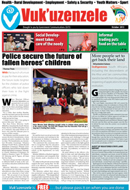
Police secure the future of fallen heroes' children
Police secure the future of fallen heroes' children sadminWith the launch of a trust to pay for their education, the future looks brighter for the children of police officers who laid down their lives in the fight against crime.
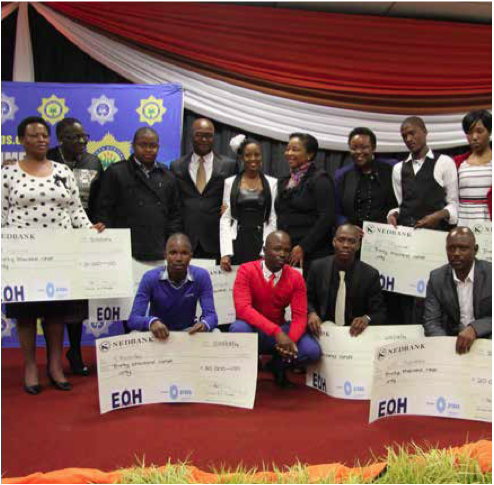 When Warrant Officer Khurishe Mphahlele was gunned down at work in 2011, the future looked bleak for his three promising children who were about to enroll for tertiary education.
When Warrant Officer Khurishe Mphahlele was gunned down at work in 2011, the future looked bleak for his three promising children who were about to enroll for tertiary education.
For a while, their mother, Raesibe, used the insurance payout she received to pay for their tuition, but the money could not last for long.
“I didn’t know how I was going to survive this year,” she says.
But then Police Minister Nathi Mthethwa launched the South African Police Service (SAPS) Education Trust at a ceremony that paid tribute to officers who paid the ultimate price in service of their country.
The Minister used the occasion to announce the first 11 beneficiaries, whose parents are police members who died on duty. The beneficiaries are Amukelani Rivombo (Gauteng), Tshepiso Medupi (North West), Lekoba Ronald Mokabane (Limpopo), Pheladi Grace Mphahlele, Samuel Khutso Mphahlele, Boledi Mphahlele (Limpopo), Tsholofelo Charity Mankanye (Limpopo), PL Sobikwa (Eastern Cape), PV Hlalele, GL Sebueng and K Ngozo, all from the Free State.
The trust will pay for their education in different fields of study at the various tertiary education institutions they attend.
Minister Mthethwa commended the recipients for showing a love for education at a time when many young people were attracted to bad influences. “We are proud of you because you are growing at the time when the youth are under constant challenges of unemployment, substance abuse and crime.”
He said the trust was set up to provide the best education and training for the development of children of members who died in the line of duty.
“We undertook this conscious decision in recognition that the education of our members’ orphaned children is a fundamental social responsibility which, as the department, we fully embrace.”
Minister Mthethwa thanked organisations, institutions and companies that have already made a donation to the trust.
He called on the private sector to help support the trust, saying that “for the trust to be efficient, it would require financial, corporate, training and moral support”.
The Minister added that education protected young people against negative influences. "The marginalised (young people) represent an easy target for gangs and syndicates; therefore, the community and its leaders should pay attention to the issue of social exclusion. One of the fundamental programmes in addressing such challenges is through investment in education for our youth.” He expressed confidence in the progress made by police in the fight against crime. “The consistent downward trend of crime statistics bears testimony to this fact. Nevertheless, we need to do much more.”
He paid tribute to the officers who died on duty and said educating their children was a token of appreciation for their heroic actions. “We can never bring them back to life but hope such an important initiative of furthering their children’s education … shall communicate a message that their gallant actions were not in vain”.
Mphahlele says the trust has helped relief her financial burden. “Boledi alone needed R56 000 for her National Diploma in Civil Engineering at the Mangosuthu University of Technology. The R30 000 she received from the trust will go a long way towards paying for
More people set to get back their land
More people set to get back their land sadminIndigenous South Africans, including the descendants of the Khoi and San communities, stand to benefit from the pending reopening of applications for land restitution.
Government has started to change the law governing land rights to allow people who missed the previous deadline of 31 December 1998 to apply for restitution. The new cut-off date will enable people who were dispossessed of their land by apartheid laws such as the 1913 Native Land Act to regain their land back.
The Land Rights Amendment Bill will extend the date for lodging a claim for restitution to 18 June 2018. Once the law has been changed, government will invite people who were dispossessed of land and who meet the criteria, to check if they have a valid claim and, if they do, to lodge their claim.
The Bill was published for public comment in June and will now be tabled for Cabinet approval and taken to Parliament to complete the legislative process.
Rural Development and Land Reform Minister Gugile Nkwinti said the Khoi and San people were the first to defend the land when the country was invaded by colonialists.
“We could not, as a democratic government, under- standing our history, be happy and satisfied when some of us were not catered for and I think it was not a deliberate exclusion, but it was more of a systematic exclusion. “The Khoi and San were left out of the process even though they were the first to be dispossessed of their ancestral land before the notorious 1913 Native Land Act was passed so now is time for us to go back and go beyond the cut-off date of 1913.”
Audit of registered state land report
Cabinet recently approved a report presented by Chief Surveyor-General, Mmuso Riba. It revealed that private individuals, companies and trusts owned 96 million hectares of land. “We were able to determine that the state owned 14 per cent of land in South Africa, and private entities - whether it’s private companies or pri vate individuals - owned 79 per cent of land,” said Riba. Spokesperson for the Ministry of Rural Development and Land Reform Mtobeli Mxotwa said the purpose of the exercise was to determine first how much land the state owns, what it is used for, who the occupants/users are and what buildings and improvements exist on it.
This will be used to update the land register which will serve as the basis for enhanced land planning and administration, including other functions relating to property portfolio management as well.
National Department of Social Development Social Work Scholarship
National Department of Social Development Social Work Scholarship sadminNational Department of Social Development Social Work Scholarship
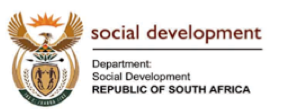
You have until 31 October 2013 to apply for the scholarship offered by the Department of Social Development to students registered for Social Work. The scholarship is open to current Social Work students as well as prospective students who would like to enroll for a Social Work Degree. It covers Registration, Tuition, Prescribed books, stipend for practicals and official accommodation provided by the University.
To apply, you must:
• Be a South African Citizen
• Comply with the entry requirements set by the University
• Fully and correctly complete the Scholarship Application form
• Be prepared to enter into an agreement with the Department
• Complete the qualification within the minimum period as prescribed by the University
The application form is available from the Social Work faculty at the University or from the Provincial Departments of Social Development
Attach your CV, certified copies of grade 12 results, Academic Record, Identity Document, your parents or legal guardian identity document and their proof of income.
If you are a current Social Work Scholarship Holder, you must have passed and be progressing to the next level of your studies to be considered for further fund
For more information, contact Vuyelwa Mngadi at (012) 312 7294 or email: VuyelwaM@dsd.gov.za or Keiloe Bosman at (012) 312 7223 or email: Kefiloeb@dsd.gov.za.
Metros make public transport a pleasure to use
Metros make public transport a pleasure to use sadminTransport Month
Metropolitan municipalities across the country are changing the face of public transport and improving the commuter experience.
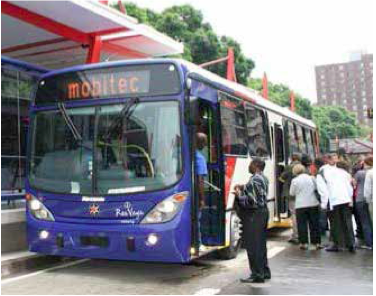 Various metros are at different stages of building the bus rapid transport (BRT) system which provides sleek buses with dedicated lanes to transport commuters safely, cheaply and swiftly to destinations that cut across established routes.
Various metros are at different stages of building the bus rapid transport (BRT) system which provides sleek buses with dedicated lanes to transport commuters safely, cheaply and swiftly to destinations that cut across established routes.
With buy-in from the taxi industry and improved road network, the BRT system is slowly turning South Africa’s public transport system into one of the best in the world.
This much was confirmed by delegates to the Annual Metropolis Meeting held in Sandton recently who praised Johannesburg's “Rea Vaya” bus system as a pioneering transport system.
City of Johannesburg, Gauteng
The City of Johannesburg was the first to implement the Rea Vaya Bus Rapid Transport (BRT) system in 2009.
The BRT covers over 25 km between Soweto and the city centre, transporting an average of 42 000 passengers a day.
A new route recently launched runs from Parktown through Auckland Park, Westbury, Industria, Bosmont and Noordgesig to Soweto. The City of Johannesburg director of marketing and communications, Benny Makgoga, says that since its launch four years ago the system has created 21 911 construction jobs (55 days of employment). There are 48 stations across the Greater Johannesburg area, with 143 buses in Phase 1A. Phase 1B will see 13 new stations come into operation soon with a fleet of 134 buses.
The city is now set to construct another route from the inner city to Alexandra and Sandton. The new route will be completed in 2016.
City of Cape Town, Western Cape
The City of Cape Town has upgraded its infrastructure and is almost ready to welcome commuters to its integrated rapid transit (IRT) system. Director for IRT projects and implementation, Dave Hugo, says construction of Phase 1A will be finished in November.
The Cape Town system will stretch for 17. 7 km of median bus lanes, 2 km of bi-directional lanes, and 20.5 km of mixed traffic. There will be 51 km of bi-directional feeder routes. The system will have 17 stations and 137 stops. So far, the city has spent R 5.2 billion on the IRT.
City of Tshwane, Gauteng
Construction of the City of Tshwane’s integrated bus rapid transit system (BRT) called “A Re Yeng” (Let’s go) started in August 2012. The system will set back the city R3.2 billion for phase 1 until 2017. The project has created over 700 jobs thus far.
Project manager of the Tshwane BRT system Lungile Madlala says it is intended to transform the public transport system by using modern technology.
“The BRT System will be characterised by various elements such as segregated median bus lanes, BRT stations, state-of-the-art buses, smartcard technology which will provide the system with the tools to attain the efficiency, safety and universal accessibility which are but some of the goals and objectives the BRT System.”
Ethekwini Municipality, KwaZulu-Natal
The eThekwini Municipality is implementing an integrated rapid public transport network (IRPTN) comprising 250 km of public transport corridors of which some 60 km are rail-based. Of the remaining 190 km of road-based trunk corridors, 60 km are to be implemented early in 2016.
The full IRPTN network will be within 800m (10 to 15 minutes’ walk) for more than 85 % of the municipality’s population.
Ekurhuleni Metropolitan Municipality, Gauteng
The head of the department for transport planning and provision in Ekurhuleni, Yolisa Mashilwane, says they will soon have their own BRT system.
“We intend to start construction mid-2014. We are busy with the designs and [will] launch the operations in 2016.”
The system is expected to transport 33 000 commuters daily between the central business district of Boksburg and Vosloorus and between Tembisa Hospital and OR Tambo International Airport.
The city has received R240 million from National Treasury's public transport infrastructure grant to start planning for its BRT.
South Africa gets world-class transport infrastructure
South Africa gets world-class transport infrastructure sadminTransport Month
October is Transport Month and this year the focus is on infrastructure development and job creation.
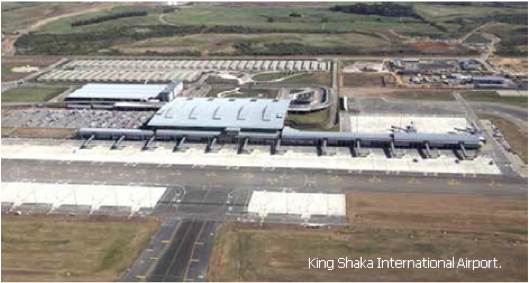 Under the theme ‘Celebrating 20 years of providing safe, reliable and affordable transport', the Department of Transport is highlighting progress made since the dawn of democracy to upgrade transport infrastructure. The democratic state developed the National Transport Plan to refurbish public transport through projects such as the Gautrain Rapid Rail system, the upgrading and building of new airports, the refurbishment of existing rail lines, adding new routes to the Bus Rapid Transport system, and creating thousands of jobs for ordinary citizens through the S’hamba Sonke and other initiatives.
Under the theme ‘Celebrating 20 years of providing safe, reliable and affordable transport', the Department of Transport is highlighting progress made since the dawn of democracy to upgrade transport infrastructure. The democratic state developed the National Transport Plan to refurbish public transport through projects such as the Gautrain Rapid Rail system, the upgrading and building of new airports, the refurbishment of existing rail lines, adding new routes to the Bus Rapid Transport system, and creating thousands of jobs for ordinary citizens through the S’hamba Sonke and other initiatives.
Bridge City Development
Residents of Inanda, Ntuzuma, and KwaMashu in KwaZulu-Natal stand to benefit from the Bridge City Development. The project is the first integrated development which includes a regional hospital, a magistrates’ court, retail, commercial and residential buildings, a shop- ping mall and an intermodal transport system of buses, taxis and trains.
Launched by President Jacob Zuma, the R1.2 billion project is a joint venture between the eThekwini Municipality and Moreland. It has created about 25 000 permanent jobs and 27 500 temporary construction jobs. The Bridge City Development will be opened officially this month by President Zuma.
Gautrain Rapid Rail Link
The Gautrain is the first world-class rapid rail link to be built in the country to connect commuters and alleviate congestion on the provincial road network. Between 2011 and 2012, some 5 million commuters used the general route and 1. 5 million used the airport link.
In just one year, the number of commuters using the Gautrain airport route rose seven per cent to 1, 6 million commuters, and the general routes showed an 83 per cent increase to 9 mil- lion people. The Gautrain has created 11 700 direct and 63 200 indirect jobs. Approximately 10 400 staff were trained and skilled in various areas of the project.
Airport infrastructure
The new King Shaka International Airport in Durban is government’s second-largest trans- port infrastructure project after the Gautrain. Built in May 2010, the R6.7 billion airport has 18 bays for passenger aircraft, a 3.7 km-long runway, and the capacity to handle 7.5 mil- lion passengers a year. The project has created almost 270 000 direct and indirect jobs. King Shaka International is part of the Dube Trade Port development - the only facility in Africa that brings together an international airport, cargo terminal, warehousing, offices, a retail sector, hotels, and an agricultural area.
South Africa’s biggest airport, OR Tambo International Airport, had a R5 billion upgrade and revamp in 2010. The airport now has a multi-level terminal linking the domestic and international terminals, 75 check-in counters, 33 lifts, 34 escalators, two 90 m-long baggage carousels, 10 000 m2 of retail space, and a R496 million new multi-storey parkade which allows the airport to accommodate 17 500 vehicles.
Mthatha Airport in the Eastern Cape was also upgraded from a domestic airstrip to an international airport. The South African Air Force will use it for military training. The R465 million upgrade focused on upgrading the passenger and freight hub linking road, rail and air transportation and effectively becoming a gateway to the province. The upgraded airport has enabled government to unlock the economic growth potential of the region and the province as a whole.
S'hamba Sonke
S'hamba Sonke: Moving Together is a nationwide drive to create jobs by maintaining and constructing road infrastructure. In partnership with provinces and municipalities, the Department of Transport is improving access to schools, clinics and other social and economic opportunities by drastically upgrading the secondary road network and fixing and repairing potholes throughout the country. The programme has created more than 150 000 jobs, and expects to have created 400 000 by the end of 2014. The project received an allocation of R7.5 billion in 2012/13 and R8.2 billion for 2013/14.
Govt care brings relief to needy people
Govt care brings relief to needy people sadminSocial Development Month
Since the dawn of democracy, the Department of Social Development has extended social services and grants to all needy South Africans, making life more bearable for people who would otherwise be living in abject poverty.
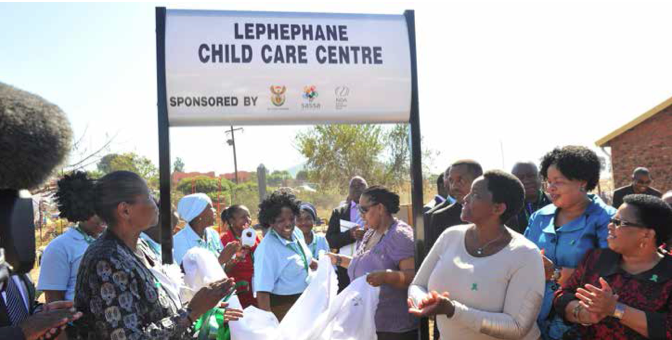 Vulnerable South Africans , including children in need and the elderly, can access many services and social grants provided by the state. These include various types of grants, food relief programmes, early childhood development centres, old age homes, home-based and com- munity-based care for people living with HIV and Aids, foster care, adoption services, child protection services and maintenance.
Vulnerable South Africans , including children in need and the elderly, can access many services and social grants provided by the state. These include various types of grants, food relief programmes, early childhood development centres, old age homes, home-based and com- munity-based care for people living with HIV and Aids, foster care, adoption services, child protection services and maintenance.
To mark Social Development Month this October, the Department of Social Development has launched its new flagship programme, Project Mikondzo, which means “increasing the footprints”, in Xitsonga.
The project will focus on 1 300 of the poorest wards in the country, bringing a wide range of services to those communities. The intention is to extend the reach of the services that the department and its entities provide to South Africans at community level. “How can we begin to understand the plight of our people without walking in their footsteps?” asks Minister Bathabile Dlamini.
But the department faces huge challenges in its endeavour to reach out to the needy. Despite the many strides made in uplifting communities, the department is confronted by harsh realities that face thousands of South Africans today, such as hunger, domestic violence and abuse.
“We deal with families, problems of disintegration, families that face unemployment due to the economic downturn, families plagued by domestic violence, women and children who suffer from abuse: we deal with child- and youth-headed households, substance and alcohol abuse - these all lead us back to creating a solid foundation for children and families,” says Minister Dlamini.
Access to grants
Before 1996, only two million people were receiving grants. This number has increased to about 15 million recipients today. What is an even greater achievement, says Minister Dlamini, is that the better part of the grants, approximately 11 million are children. “This allows us as a government to build the best foundation for our children, and ensure that no child goes to school without a plate of food.” The department has also made great strides in increasing the older persons grant from bimonthly to monthly. Previously women received a grant at 60 and men at 65. "We have since equalised this to 60 years old,”Minister Dlamini adds.
Early Childhood Development (ECD)
The department is focused on creating a better foundation for children and families by increasing access to ECD services. ECD provides the crucial educational foundation in the first four years of a child's life. This is a critical stage in the grooming of human beings - when their emotional, psychological and physical stability, behaviour and intellect are instilled. The department is working towards ensuring that all ECD centres are registered and early childhood practitioners are appropriately trained. “I strongly believe that if we as a country and as a department can focus on children, we can take many families out of this cycle of poverty,” says Minister Dlamini.
Placing a focus on parenting
Many factors affect a child's growth or a family's development. To assist parents in enhancing the formative years of children, the department has launched various empowerment programmes. These include teaching parents, through the help of social workers, to assist and mould children, and to create a safe and stable family setting. One of the major challenges affecting our society is that of alcohol and substance abuse. “This is a battle that government cannot fight alone. It goes back to parenting, and parents have to take responsibility play their role,” says Minister Dlamini.
Programmes for parental training are also underway. The programme will see social workers going into communities to teach parents on parenting. Parents need to be taught the basic fundamentals about parenting. “We have so many young mothers aged 15, who have no idea on how to parent. We have parents who work and neglect their parenting duties and do not understand the roles and responsibilities that actually come with being a parent.”
What children in our society lack is trust and guidance, adds Minister Dlamini. “Parents need to build trust amongst their children and not fail them, so that children are able to tell their parents what is actually going on around them. They should be the first ones to report abuse or any challenges they face.”
Creating a support system
South Africa has more than a million orphans, - children who live with their grandmothers and children who take care of themselves and their younger siblings. “Through child support grants, we will have fewer children not attending school and a lower rate of drop-outs,” says Minister Dlamini. Another huge project soon to be rolled will complement the child support grant and eventually take young people off the grant system. The new programme will encourage and help young mothers and caregivers to improve their skills and try harder to find work. The ultimate goal will be to get people to be economically active instead of relying on grants.
“We have already established an agreement and are working together with the Department of Basic Education to ensure that young children attend school and young mothers who have dropped out of school also complete their schooling,” explains the Minister.
In addition, mothers must find employment, at least twice a week, which will develop their skills and in the long run enable them to find full-time employment so they in turn will not need or rely on a child support grant.
-
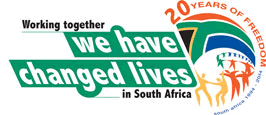 No child should go hungry. The number of children on child support grants has grown from 21 997 in 1999 to 11 million in 2013.
No child should go hungry. The number of children on child support grants has grown from 21 997 in 1999 to 11 million in 2013. - We care for older persons. The number of people on old age grant increased by a third from 1997 to 2013. Old age grant recipients grew from 1.9 million in 1997 to 2.9 million in 2013.
- Protecting people against poverty, , the total number of people on social grants has grown from 3 million in 1997 to 16 million in 2013.
Source: South African Social Security Agency
A cash-less system for grant recipients
A cash-less system for grant recipients Estelle GreeffSocial Development Month
Social grant beneficiaries can now use their new SASSA MasterCards to buy groceries and pay bills, with, just one swipe. It's that easy.
 Eighty-four-year-old Nthabiseng Tshabalala from Orlando East receives an old age grant and loves her new South African Social Security Agency (Sassa) MasterCard because it allows her to shop without needing to have cash with her. “It is so convenient,” she says.
Eighty-four-year-old Nthabiseng Tshabalala from Orlando East receives an old age grant and loves her new South African Social Security Agency (Sassa) MasterCard because it allows her to shop without needing to have cash with her. “It is so convenient,” she says.
Tshabalala is one of 10 million recipients of the new smart cards, thanks to Sassa and MasterCard. Having a card means that social grant recipients no longer have to wait for hours on end every month to receive their grant payments in cash.
The new cash-less system aims not only to improve the lives of the poor, but also to stop fraud and corruption, which is a huge problem in the payout of social grants. The rollout began in March last year when Sassa called on all beneficiaries to reregister on the system and have their biometric details captured. These details include fingerprints, voice and other personal information that are unique to you.
In just under a year, Sassa re-registered just udner 22 million beneficiaries. Because one card holder can receive multiple grants for beneficiaries in the same family, only 10 million people received the new card. “In many cases we have a grandmother receiving a grant for older persons, a foster care grant or a child support grant. This new system puts all the payments on one card, eliminating duplication and ensuring that only those who qualify recive the grants," says Sassa chief executive officer Virginia Petersen.
Beneficiaries can use the smart card at any store that accepts MasterCard. This makes it easier for you to shop or pay bills. Soon it will be possible for cardholders to get discounts on various things, including Rea Vaya bus tickets.
All beneficiaries who have not re-registered despite the many extensions provided by Sassa, will be cut-off from the system. Those who can prove they do indeed qualify for a grant will need to reapply for a grant from scratch. If you have lost your personal identification number (PIN) codes, simply go to your nearest Sassa office, be identified on the biometric system and have your PIN code changed.
New hospitals promise specialised care for children
New hospitals promise specialised care for children sadminWith the renovation of the KwaZulu-Natal (KZN) Children’s Hospital proceeding well, South Africa is well on the way to getting its second specialised hospital for children.
 The reconstruction of the old outpatients building was completed in December 2012 and the referral of patients to the new section started in March 2013.
The reconstruction of the old outpatients building was completed in December 2012 and the referral of patients to the new section started in March 2013.
Situated on the Durban beachfront, the hospital was built in 1928 as the Addington Children’s Hospital dedicated to child and infant healthcare.
“In 1984, the hospital was closed by the apartheid government because it offered services to children of all races in an area of Durban reserved for white people. The hospital was closed for 28 years,” said KZN Health Member of Executive Council (MEC) Sibongiseni Dhlomo.
The hospital will be second children’s hospital in the country after the Red Cross War Memorial Children's Hospital in Cape Town, which has been South Africa's only health institution dedicated to child health care.
Children from all provinces and from all over Africa are referred to the hospital by other hospitals, clinics and smaller hospitals, but this is all set to change when the KwaZulu-Natal Children’s Hospital starts operating.
The hospital will include a specialised paediatric outpatient clinic, short-stay wards, training and research facilities, care-giver and health provider accommodation, counselling and rehabilitation facilities.
The ground floor of the old outpatients building of the hospital houses a Child Neuro-Development Assessment Centre, an adolescent clinic, rehabilitation and psychosocial services. The centre also includes a comprehensive assessment, counselling and referral service to families with ‘high risk’ children and children with special needs including developmental disabilities and genetic syndromes. Rehabilitation and remedial services include speech and audiology screening and assessment, physiotherapy, occupational therapy, neuro-physiology testing audiologist assessments, and psychometric testing.
The path to renovation
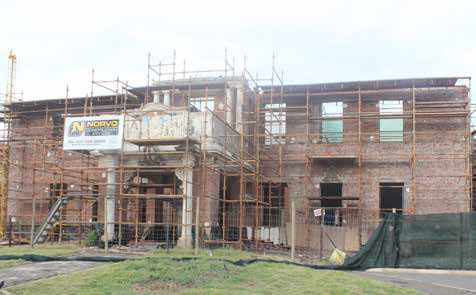 The KZN Department of Health and the KZN Children’s Hospital Trust started planning the renovation and re-establishment of the old Children’s Hospital, now renamed the KwaZulu-Natal Children’s Hospital, in 2009.
The KZN Department of Health and the KZN Children’s Hospital Trust started planning the renovation and re-establishment of the old Children’s Hospital, now renamed the KwaZulu-Natal Children’s Hospital, in 2009.
The hospital renovations are expected to take five years and cost between R250 and R300 million. The renovations are occurring in phases with the first phase completed in December 2012. Operations began in May 2013, Dhlomo explained. The hospital has seven buildings, four of which are heritage buildings.
The KZN Department of Health has pledged R50 million towards the overall infrastructure costs of renovating the Children’s Hospital and will also budget for the operational costs, including maintenance costs for the hospital. The KZN Children’s Hospital Trust has been established as a non-profit, public benefit entity for fundraising and project management of the re-establishment of the Children’s Hospital.
Renovations to the roof and external façade of the Old Children’s Hospital started in February and are continuing well. This work will include bulk services such as electricity, sewer and IT connections along with the repairs to the roof and external façade of the old nurses’ home building.
Finally, attention will shift to the hospital building, the old nurses’ home, the administration block central nurses home, the central museum and old dining hall as well as a playground for children of all abilities.
The KZN Department of Health is also refurbishing health infrastructure elsewhere in the province.
Last year the BHP paediatric centre of excellence was built within the surroundings of the King Edward Hospital in Durban with assistance from commodity company BHP Billiton. It consists of the intensive care unit, consulting services and staff facilities.
Mandela Children's Hospital
Meanwhile, the national Department of Health has entered into a partnership with the Nelson Mandela Hospital Trust and other private sector donors to build a state-of-the art children’s hospital in Parktown, Johannesburg. Construction of the Nelson Mandela Chidren’s Hospital, which is expected to be the biggest children’s hospital on the continent and serving the southern African region, is underway. The department will provide operational expenditure for the hospital.
Take care of your kidneys; they’ll take care of you
Take care of your kidneys; they’ll take care of you sadminKidney disease is a major illness affecting 10 per cent of people in South Africa, mostly blacks. But it can be prevented.
 Many black South Africans suffer from kidney disease, an illness that can be prevented with cor-ect lifestyle choices. According to the National Kidney Foundation of South Africa, black people are four times more likely to suffer kidney failure than any other group, mainly due to undetected and untreated high blood pressure.
Many black South Africans suffer from kidney disease, an illness that can be prevented with cor-ect lifestyle choices. According to the National Kidney Foundation of South Africa, black people are four times more likely to suffer kidney failure than any other group, mainly due to undetected and untreated high blood pressure.
Those who suffer from different forms of kidney disease are also at high risk of diabetes. High blood pressure is usually the cause of about 65 per cent of all cases of kidney disease, while diabetes is responsible for about 25 per cent.
What do the kidneys do?
The kidneys play an important role in keeping your body healthy. These two organs, located around your waist area, are your filters. They filter waste and excess water out of your blood and make urine. They also keep the body in chemical balance, juggling chemicals like salt and potassium. They help control your blood pressure, and make certain hormones. If you have chronic kidney disease (CKD), it means your kidneys are damaged, your kidneys struggle to filter your blood to keep you in tip-top health. Waste substances can therefore build up.
The bad news is that once there’s damage, it can't be fixed. For example, Glomerular Filtration Rate (GFR) is a measure of kidney function. Your GFR can be anywhere between 0 and 100, where 100 is perfectly healthy. If it’s 90, you can’t do anything to push it back up to 100, but the good news is that there is a lot you can do to prevent your GFR from dropping lower. So start making the right lifestyle choices now, change how you live and eat, and visit your doctor or local clinic for regular checkups.
Stop unhealthy choices right now
Smoking is very bad for your kidneys. Try to stop today; give up now rather than face possible dialysis in future. A diet high in salt also affects the kidneys. Try to limit your salt intake and start improving the way you eat. Also be cautious about medication such as painkillers and anti-inflammatory drugs. Consult your doctor to find out if they are safe for you to take.
Make health your choice in every way
Get your blood pressure tested as soon as possible. If you have high blood pressure, keep it under control. Never miss a dose of your blood pressure medication. Also try to keep your salt levels low, your weight down and get regular exercise. This also reduces stress, and will help you control adult-onset diabetes if you have it.
Eat fresh vegetables and fruit, and stay away from starches and sweets. Try to avoid bananas as they contain high levels of potassium and cause problems for your kidneys. Lots of water is essential, but drinking too much could be harmful. It all depends on how your body is coping. Visit your doctor to find out the right balance for you.
Warning signs of kidney disease?
Kidney disease usually affects both kidneys. These are the warning signs of kidney disease: High blood pressure; blood or protein in the urine; a GFR rate of less than 60; frequent urination, particularly at night; difficult or painful urination; puffiness around the eyes; and swelling of the hands and feet.
New universities get ready for 2014
New universities get ready for 2014 sadminPlans are on track for new universities in Mpumalanga and the Northern Cape to open in time for the 2014 academic year.
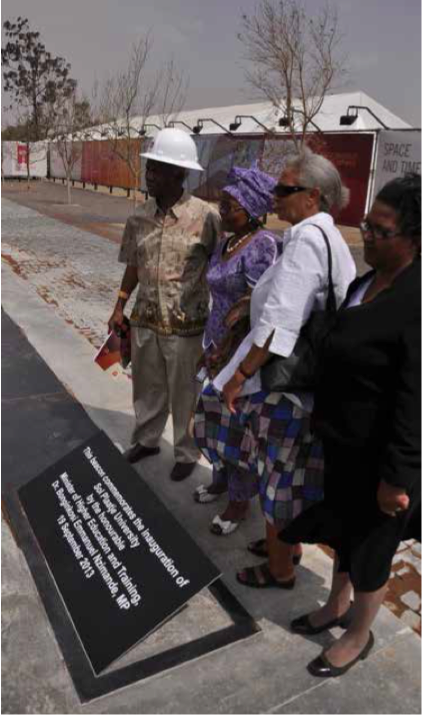 The University of Mpumalanga in Nelspruit and the Sol Plaatje University he University of Mpumalanga in Nelspruit and in Kimberley are preparing to admit their first students in time for 2014.
The University of Mpumalanga in Nelspruit and the Sol Plaatje University he University of Mpumalanga in Nelspruit and in Kimberley are preparing to admit their first students in time for 2014.
The new campuses will provide additional capacity to the higher education system and will also see the creation of new specialised academic departments.
“We are establishing these institutions because we want every province in the country to provide institutions of higher learning”, said President Jacob Zuma at a media briefing recently. "In the last decade we have witnessed growth of over 50 percent in the number of enrolments. Numbers moved from 603 000 students enrolled in 2001 to 935 000 in 2012."
He added that the new universities would help government to reach its National Development Plan goal of increasing higher education enrolments from 17.9 per cent in 2012 to 25 per cent by 2030.
As part of the initial intake in 2014, the Sol Plaatje University will accept 150 students and the University of Mpumalanga will enroll 140. Over a 10-year period, the Department of Higher Education and Training (DHET) aims to reach a target of 15 000 full-time students at each university. The first newly-constructed academic buildings are expected to be ready by 2015.
In the meantime, lectures will be held at the National Institute for Higher Education in Kimberley, and programmes in Mpumalanga will be presented at the Siyabuswa Campus, the Mpumalanga Regional Training Hotel Academy, in Kanyamazane, and the Lowveld College of Architecture in Nelspruit. The University of Mpumalanga will start as a multi-campus institution with two campuses: one in Nelspruit and another in Siyabuswa. The Sol Plaatje University will be established initially on the main campus, but may expand further as a multi-campus university in future.
In January this year preliminary academic programmes were created for each university and established universities such as the University of Johannesburg came on board to support academic programme development and delivery. Management and academic staff were also appointed by the interim councils of each university recently.
The specialised courses that will be introduced at the University of Mpumalanga are agriculture and biodiversity studies such as food security, natural resource management, nature conservation, plant and animal sciences, forestry and wood sciences, technology and wildlife management. Curricula at the Sol Plaatje University will focus on heritage studies, museum management, archaeology, indigenous languages and restoration architecture.
Higher Education and Training Minister particularly those that do business in the two provinces, to come on board with additional funding. Total operational costs are estimated to run to R6.6-billion and R10.3 billion for the Sol Plaatje University and University of Mpumalanga respectively. Minister Nzimande also added that grants and subsidies would be the main source of funding for learners during the universities’ ten-year development programme, but additional investment would also be required.
President Zuma has said “All successful countries prospered because they invested in education and skills development. Our young people are hungry for education and the development of these new institutions is designed to respond to this hunger”.
-
 South Africa is getting smarter by the day. The number of students enrolling for post-school education has nearly doubled from 345 566 in 2009 to 657 690 in 2012.
South Africa is getting smarter by the day. The number of students enrolling for post-school education has nearly doubled from 345 566 in 2009 to 657 690 in 2012. - The amount of money government spent on FET bursaries in 2013 was more than five times that spent in 2009. It grew from R318 million in 2010 to R1.9 billion in 2013.
- The number of students financed by NSFAS increased from 14 926 in 1994 to 199 479 in 2012
- The amount of money spent by NSFAS to finance students increased from R2.2 billion in 2010 to R3.6 billion in 2013.
Source: Department of Higher Education and Training
FET colleges attract thousands of students
FET colleges attract thousands of students sadminSince they were introduced in 2009, Further Education and Training (FET) colleges have seen a steady increase in enrolments.
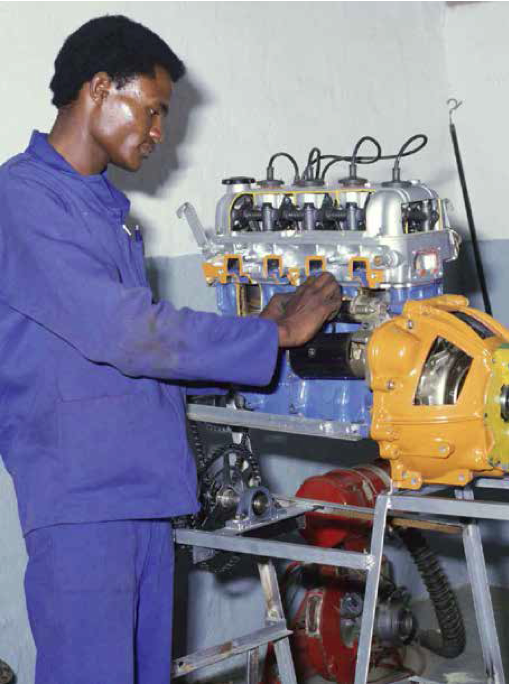 According to the Public FET Data Survey, in 2010 the colleges had 358 393 students and in 2011 they had 400 273. The next year 509,643 students registered at all the colleges. This year, the number of FET students has soared to 551 670 in 50 colleges.
According to the Public FET Data Survey, in 2010 the colleges had 358 393 students and in 2011 they had 400 273. The next year 509,643 students registered at all the colleges. This year, the number of FET students has soared to 551 670 in 50 colleges.
The Department of Higher Education and Training (DHET) says the 50 colleges resulted from the merger of the 152 technical colleges.
The colleges offer various courses from engineering to business studies. “FET Colleges primarily offer ministerially-approved programmes, which currently constitute the National Certificates (Vocational) qualifications and the N1-N6 Engineering Studies programmes, as well as the N4-N6 Business Studies programmes,” said the department.
The colleges also offer qualifications from NQF levels 2 to 6. In December 2012, the South African Qualifications Authority (SAQA) declared the N4 to N6 certificates to be equivalent to NQF level 5 and the National N Diploma at NQF level 6. These post-matric students who, with the compulsory experience, are able to readily access the labour market.
FET College bursary scheme
To promote access to FET colleges, the DHET established a bursary scheme. In 2012, it increased the allocation from R1.7 billion in 2012 to R1.9 billion in 2013.
The scheme has assisted 188 182 students and is expected to aid a further 222 817 students in the 2013 academic year.
“Students may apply for a bursary at any of the 50 public FET colleges. It is advisable to apply for financial assistance a year preceding the academic year. Students have to contact the institution of their choice in regard to its specific deadline for the submission of bursary applications.
“FET college students are not expected to repay bursary funds on completion of their studies. However, students have an obligation to perform well in their studies as they will not be awarded a bursary if they fail to progress to the next level of their studies,” said the department.
To qualify for a bursary you must be:
- A South African citizen
- Enrolled in or intend to enrol for the National Certificate programme at any of the 50 public FET colleges in South Africa
- In need of financial assistance
- Able to demonstrate potential for academic success.
Earlier this year, Minister of Higher Education and Training, Blade Nzimande, announced that the department would build 12 new FET college campuses across the country.
Tugela River Bridge brings KwaNomova Village relief and prosperity
Tugela River Bridge brings KwaNomova Village relief and prosperity sadminSince the R25.5millionTugela River Bridge was opened, the villages of KwaNomoya and Sahlumbe in Ladysmith have come alive with the development stimulating economic activity, social life and schooling.
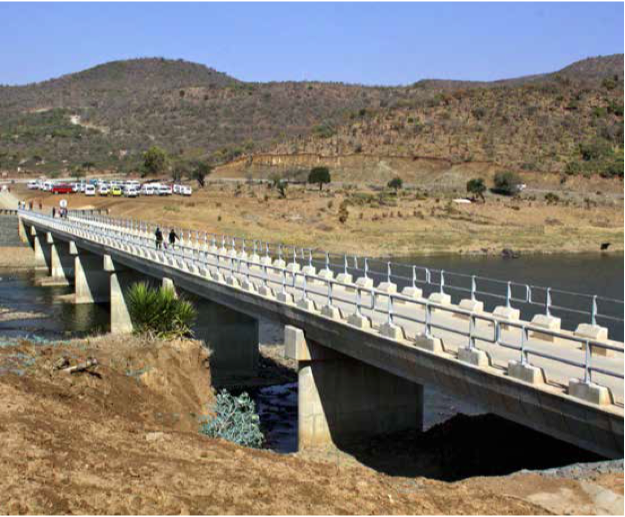 The construction of the new 135-metre-long Tugela River Bridge has revived social connections, boosted economic activity and improved access to education and health facilities between the villages of KwaNomoya and Sahlumbe in Ladysmith, KwaZulu-Natal (KZN).
The construction of the new 135-metre-long Tugela River Bridge has revived social connections, boosted economic activity and improved access to education and health facilities between the villages of KwaNomoya and Sahlumbe in Ladysmith, KwaZulu-Natal (KZN).
Gone are the days when villagers from KwaNomoya struggled to cross the river just to buy household goods, attend schools or visit a clinic in Sahlumbe village.
Ward councillor Mdungiseni Ngubane says the change in the area is very exciting. “For as long as I can remember, KwaNomoya has always been faced with vast development challenges. The area has no school and clinic and up until recently it had no shops.”
He says the local people used to get to the other side with a small boat that was not in good condition.
Before the bridge was built, about 200 learners used to risk their lives crossing the crocodile-infested Tugela River to go to Thuthukani Primary and Sahlume High School every day.
“Parents were sometimes reluctant to allow their children to go to school because it was unsafe for children to cross the river. This has all changed, even the small children attending grade R are now able to go to school.”
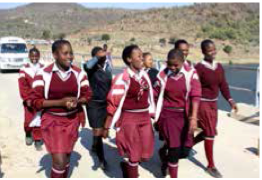 Ngubane says the construction of the bridge started in 2008 and was completed in 2012.
Ngubane says the construction of the bridge started in 2008 and was completed in 2012.
“Since the construction of the bridge, we have seen four local shops being built. Villagers no longer see the need to cross over to the other side to purchase goods. Secondly, other people from surrounding villages are now able to walk over the bridge to purchase goods from KwaNomoya.”
KZN Member of Executive Council of Transport, Community Safety and Liaison Willies Mchunu officially handed over the R25.5 million bridge to the community recently.
He says the bridge has made life easier for motorists and commuters using buses to cross the river daily to access social and health services. “Importantly, the surrounding communities will now say goodbye to the unfortunate drowning incidents which have claimed seven young lives since 2000. "We are fulfilling our government’s commitment to improving the lives of the people in both rural and urban areas by delivering critical road transport infrastructure.”
The new bridge will also connect district road D1275 to the main road P280 south of the Tugela River, which will connect the village to the province and the country. “Providing the public with a safe, integrated, affordable and accessible transport infrastructure is the essence of our mandate. With this bridge we are adding to an already expanding road and transport network that has markedly increased social and economic activity in the greater Uthukela District,” Mchunu adds.
The construction of the Tugela River Bridge created 16 direct jobs for members of the local community. In addition, the KZN Department of Transport has built an expansive, multi- million rand network of blacktop and gravel roads throughout the Uthukela District, which created hundreds of local jobs.
From subsistence farmers to major suppliers
From subsistence farmers to major suppliers sadminWhat started off as a small project by women of Skwahlane outside Nelspruit to provide food at home has turned into a prosperous business employing 39 people and producing tomatoes, butternuts, spinach and more.
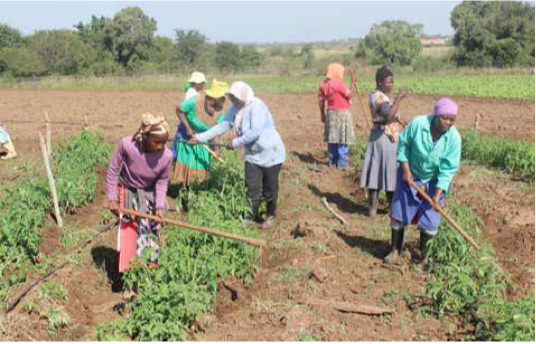 In 1996 five women started what was known at the time as the Ikhwezi Women’s Association. The women were farming to pro- vide for their families, because of unemployment.
In 1996 five women started what was known at the time as the Ikhwezi Women’s Association. The women were farming to pro- vide for their families, because of unemployment.
They produced their vegetables on a 12 hectare farm some 60 kilometres from Nelspruit and donated by the local chief of Skwahlane. The farm has now grown into a viable business, employing 31 permanent and eight casual workers. Last year the cooperative scooped the Mpumalanga Productivity SA award for outstanding achievement in productivity improvement.
The women had to work hard to get to where they are now. In 2001 they decided to introduce four young people to their group to form what is now known as the Ikhwezi Agri-Cooperative. The aim of introducing more people to the project was to transfer farming skills and to build a sustainable business.
Makhosazane Sambo, who joined the cooperative in 2001, says that before joining the group, she was a general worker at a juice factory. “I heard that there was this opportunity to be involved in farming which was something very close to my heart since my father was a farmer. I decided to quit and become a member of the Ikhwezi Agri-Cooperative.”
In those early days, a lack of funding made it difficult to get the cooperative off the ground, recalls Sambo.
Things improved in 2006 when the Mpumalanga Department of Agriculture sponsored the cooperative with a bulldozer that was used to prepare the land.
In 2010, the group approached the Mpumalanga Department of Social Development for assistance and were granted R60 000.
“With that money we fenced off the property we were working from and also got a water pump for the crops”, says Sambo. She adds that the water pump improved their yield because the scarcity of water had badly affected their crops.
“We could see that our business was expanding and doing well and we were supplying to the Nelspruit National Market which supplies to all major chain stores around the province.
“In 2010 we approached the National Development Agency (NDA) for funding. With the money we received in 2011 we built an office block and a packing area. We also bought a freezer for the vegetables and a bakkie.”
Atypical day at Ikhwezi Agri-Village starts in the morning when workers head to the fields to look after their precious goods that will soon be sold all over Mpumalanga. On this particular day, the sun has reached 31
° C. Groups of workers wearing protective gear are hard at work, digging, weeding and reaping. The fields are covered with green crops waiting to be harvested.
Maxwell Mathebula, Mpumalanga Provincial Manager for the NDA, says Ikhwezi received R2 million from his organisation. In the last three years, the NDA has funded 44 food security projects and 65 small-scale cooperatives. In the ten years of its existence, the NDA has used over R1 billion to support communities through its programmes.
Mathebula expresses confidence that the members of the co-operative will continue to thrive.
“They have created job opportunities for community members and this is in line with the government priorities. The co-operative also addresses the issue of food security and nutrition. The vegetables that are produced are sufficient to change the lives of the poor while improving their nutritional status.” Sambo says for a cooperative to succeed, members must be given clearly defined roles.
“With the Ikhwezi-Agri Village Cooperative, members have special roles to play, looking after different aspects of the business such as finance, marketing and the daily running of the business. This makes working together easy as we work as an integrated system.”
Mathebula says a cooperative is a viable business model for farming as it works within a regulated framework.
“There is greater co-operation amongst members. There is an element of ownership and as a result members become committed to the cause. What is required to enhance this kind of co-operation is skills transfer. This includes leadership and management skills.”
SAPS comes of age to make South Africa a safer place
SAPS comes of age to make South Africa a safer place sadminThe South African Police Service (SAPS) has stepped up efforts to clamp down on crime.
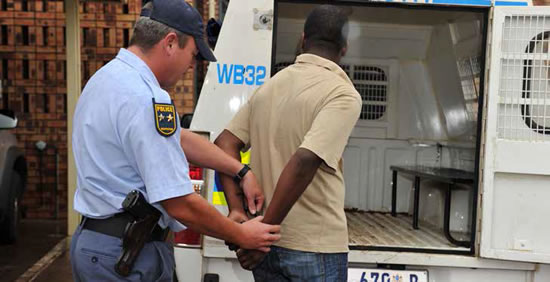 In recent months, government has in- creased the number of detectives, established units to deal with sexual offences, partnered with the private sector and communities, improved the training of police and refined its recruitment drive. These measures are designed to make South Africa a safer place. Minister of Police Nathi Mthethwa says contrary to public perceptions that crime is rampant, the level of crime has been declining. More people are beginning to feel safer. He adds that according to the Victims of Crime Survey (VOCS), the public is happy with government’s efforts to deal with crime.
In recent months, government has in- creased the number of detectives, established units to deal with sexual offences, partnered with the private sector and communities, improved the training of police and refined its recruitment drive. These measures are designed to make South Africa a safer place. Minister of Police Nathi Mthethwa says contrary to public perceptions that crime is rampant, the level of crime has been declining. More people are beginning to feel safer. He adds that according to the Victims of Crime Survey (VOCS), the public is happy with government’s efforts to deal with crime.
“According to the Victims of Crime Survey (VOCS) 2012 there is an increase of eight per cent in the public appreciation of how government is doing in reducing crime levels compared to five years ago (32 per cent in November 2007 to 40 per cent in November 2012).”
The survey also found that close to 60 per cent of households were satisfied with the manner in which the police and courts were doing their work.
Increasing the number of detectives
When he delivered his departmental budget vote speech last year, Minister Mthethwa declared 2012 the Year of the Detective. The department established 338 Detective Service Centres (DTS) to improve reaction time, improve on the apprehension of suspects and fast-track the screening of dockets.
In its first year of operation the DTS secured a high number of life sentences between 2012 and 2013. “Our detectives secured 826 life sentences during the 2012/13 financial year. Of those, 264 were for murder, 499 for rape and 63 for robbery aggravated.”He says 142 Detective Court Case Officers have been placed at selected courts across the country to improve the quality of work to and from court , secure the availability of dockets and liaise with detective commanders and prosecutors to deal with the challenges that might arise.
Partnering to put criminals on the run
To increase the success rate of dealing with crime, the police have established partnerships with private companies and community policing forums. According to the minister, it takes an integrated effort to deal with crime successfully.
The South African Banking Risk Information Centre (Sabric), Crime Line, Tracker and Business Against Crime South Africa (BAC- SA) are some of the organisations working with the police to fight crime.
When Tracker and SAPS became partners in 1996, rampant vehicle theft and hijacking in South Africa were making headlines around the world. According to the minister the status has changed.
“The picture today,[is that] while vehicle crime remains a serious concern for all South Africans it has come down significantly in recent years thanks, in no small part, to this SAPS-Tracker partnership.”
Over the past 16 years, Tracker and the SAPS have recovered close to 60 000 stolen and hijacked vehicles.
Sabric has been an important stakeholder working with the police to deal with crime affecting the banking sector.
“Through their industry expertise, they have been able to deepen and share their skills and expertise within the banking sec- tor by setting up initiatives to combat ATM crime, cheque fraud, crime in business and cyber crime”.
Another important partner in fighting crime is Crime Line. According to the minister, Crime Line’s partnership with the police has seen many arrests and the closure of drug hubs. Communities have also been mobilised to come forward with information.
Transforming from an apartheid force to a police service
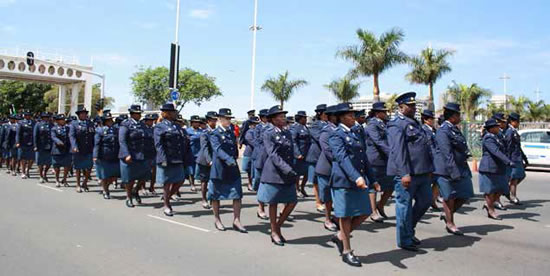 Back in 1994, as part of the new democratic dispensation, government took steps to transform the South African Police (SAP) into the new South African Police Service (SAPS). The first target was to establish capacity to deal with public order policing, namely Public Order Police (POP).
Back in 1994, as part of the new democratic dispensation, government took steps to transform the South African Police (SAP) into the new South African Police Service (SAPS). The first target was to establish capacity to deal with public order policing, namely Public Order Police (POP).
In 1995, a Technical Team drew up recommendations and guidelines for transforming the police. The recommendations were approved in 1995 and highlighted guide- lines and indicated focus areas to follow to achieve this goal.
"The first step was to amalgamate the 71 existing riot control units in the SAP and police agencies in the independent homelands into the SAPS,” says Minister Mthetwa.
“Only suitable members from all these riot control units were re-recruited, re-selected and retrained. Soft skills such as negotiation, conflict management and diversity management were also taught.”
In August 2011, the department amended the Public Order Police policy due to the increase in incidents involving the use of force in public order policing, the related injuries to participants and the negative publicity related to various incidents. “We felt it necessary to address relevant focus areas of public order policing to ensure a more effective and professional POP service,” explains the minister.
The minister adds that all new entry-level police members will undergo basic training in crowd management as part of their curriculum.
“This is primarily to establish an under- standing of crowd management in all SAPS members to facilitate joint operations with other SAPS components and POP members. “During the last intake, which completed training in March 2013, the new first responder training course was conducted to empower new police members to assess potential crowd management situations and understand the process of role function activation.”
Clamping down on sexual offences
In an effort to deal with the scourge of sexual offences, the minister instructed police management to re-introduce the Family Violence Child Protection and Sexual Offences (FCS) units. There are 176 established FCS units attached to all police clusters within the South African Police Service.
The reintroduction of the FCS units has yielded positive results and the number of life sentences secured by the police has in- creased progressively in the past three years. “There were 1 194 life sentences secured during the past three years, that is, 306 in 2010/11, 389 in 2011/12 and 499 in 2012/13,” says the Minister.
In support of the investigation of sexual crimes, 2 139 forensic social workers were appointed. “These include 79 forensic social workers appointed to assist in cases of child sexual abuse by conducting assessments, compiling court reports and providing ex- pert testimony in court to strengthen and increase conviction rates.
“Since the re-establishment of the FCS units we have secured imprisonments totalling 36 225 years,” he adds.
Taking on gangs and drugs
In recent months, there has been a resurgence of drug and gang violence in the Western Cape. To tackle it, Minister Mthetwa has called for a joint effort by all sectors of society.
"Crime prevention requires that interdepartmental cooperation extend beyond the criminal justice system to include, when necessary, departments responsible for local government, education, and social services,” says the Minister.
During the anti-drug campaign in Mitchells Plain, the department committed itself to a multifaceted approach in tackling this scourge.
The steps police have taken have put criminals on the run, increased partnerships against crime and made communities safer than before.
The couple that breathed new life into Keiskammahoek
The couple that breathed new life into Keiskammahoek sadminJeri du Plessis and her husband Brian left their plush jobs at the Council for Scientific and Industrial Research and Renown Fresh Meat respectively to start a new life in the rural town of Keiskammahoek, 40 km south of King William’s Town.
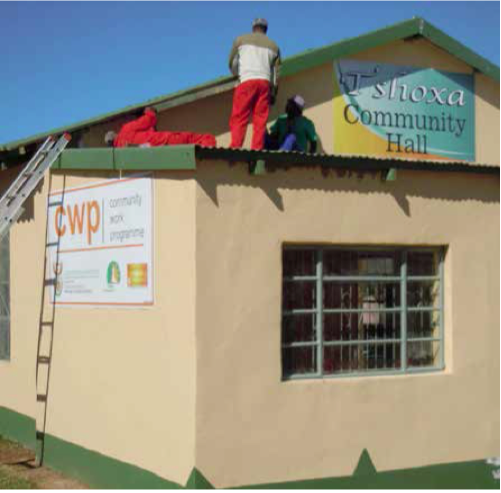
When they arrived 15 years ago the couple slept in a caravan and were chased away from where they had parked it. “It was very difficult back then” recalls Jeri. “We moved from that other side to just across the road. People were not as receptive as they are today,” she adds.
But once they had settled, the couple spearheaded the revival of the neighbourhood by encouraging community members to be enterprising through their community development projects. The couple found the school infrastructure was dilapidated, the crèche windows broken, young people desperate for jobs, and the community hall rundown.
With help from the Department of Local Government and Traditional Affairs, Jeri and Brian were instrumental in getting the community hall upgraded, the crèche painted, windows repaired and young people employed in various projects. The couple’s entrepreneurial spirit is now beginning to rub off on some members of the community.
Siviwe Twyabi has started a bee-keeping project and Nominki Manetsa is hoping to start her own company.
With guidance from the Siyakholwa Development Foundation, Manetsa is producing perfume and selling to locals. She plans to start her own company that will produce hand lotions, perfumes, soaps and shampoos using essential oil obtained by crushing the leaves of rose geranium plants.
After the leaves have been crushed, the oil is mixed with aluminium sulphite to produce a perfume called rose geranium. Manetsa says she plans to sell the perfume to hotels in the Eastern Cape.
The refurbishment of the school happened as a result of the work done by the Siyakholwa Development Foundation under the leadership of the Du Plessis couple. They rallied the community to do the work themselves.
The arrival of the couple in the sleepy town signalled the beginning of good things for Twyabi, a bee-keeper who now says he would like to start his own honey production company.
His interest in bees started in 2011 when he was taught bee-keeping by an old friend, Mark Symons. “It was just a small thing back then. I did not know that you could make money out of it.”
With financial help from the Department of Local Government and Traditional Affairs and the Siyakholwa Development Foundation, Twyabi bought protective gear to wear when working with the bees. Currently, the honey he produces is only sold to locals, but he has ambitions to expand the business.
Twyabi’s energy and determination together with support from the Foundation and guidance from the Department could see him realising his dream of owning a jam-producing company sooner rather than later.
Village cooperative turns the unemployed into employers
Village cooperative turns the unemployed into employers sadminOver the past five years, six previously unemployed villagers from Mahlathi in Giyani have set up and run a successful and growing cooperative that is providing employment and contributing to uplifting their community.
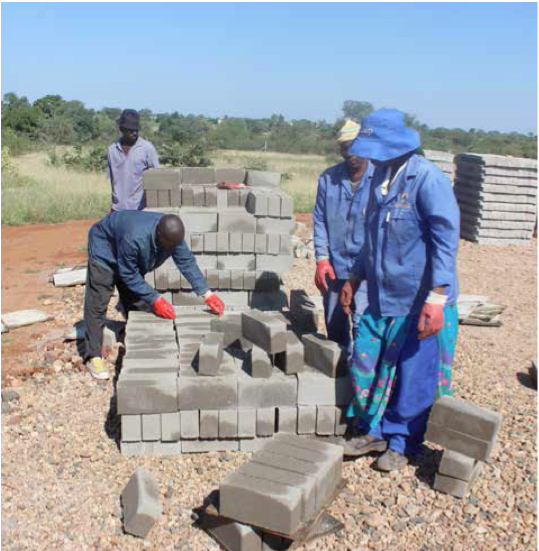 In 2008, six unemployed residents of Mahlathi village in Giyani set out to establish a cooperative to manufacture bricks, using stones that are abundant in the area. Samuel Makhongela recalls that in those early days they did not have any work experience.
In 2008, six unemployed residents of Mahlathi village in Giyani set out to establish a cooperative to manufacture bricks, using stones that are abundant in the area. Samuel Makhongela recalls that in those early days they did not have any work experience.
“I had never been employed before working for this cooperative. In fact, all six of us were unemployed before starting this business”, says Makhongela.
But with perseverance, the Ximambani Primary Cooperative was established to manufacture bricks, concrete stones and pillars. Chairperson of the cooperative David Baloyi explains that after struggling to get the company off the ground, in 2009 members approached government for assistance.
“Our request included getting assistance for buying a brick-making and stone-crushing machine to make concrete and bricks. The Limpopo Economic Development Agency (Leda) bought us two brick making machines, a generator and two pan mixers”, says Baloyi. The stones are crushed and processed to produce about 9 000 bricks daily. Their material is sold to the community and contractors employed by government to build RDP houses.
Today, the cooperative is a model of success. It For more information on Leda phone 015 287 3000, email info@libsa. co.za to locate their 20 offices around Limpopo.
is registered with the National Home Builders Registration Council and employs 36 people.
The cooperative is involved in the construction of houses and also has a license for small-scale mining of sand and concrete stone.
It is 30 °C outside, the air is humid and from the small town of Giyani, it is about 30 kilometres’ drive to Mahlathi village, where the cooperative is based on a plot of land given to them by their local chief. The rough gravel road winds past a couple of villages before I reach Mahlathi.
When I arrive at the cooperative there are groups of workers crushing, mixing and making bricks. Crushing the stone looks like a difficult job to do, especially in the heat that is essential for drying the bricks placed in rows. The smell of concrete and sand fills the work area.
Members of the cooperative say their lives have changed for the better. “We are acquiring skills to provide for our families. Not only do we have jobs but we can also create employment opportunities for other people”, says Makhongela.
In March this year, to thank the community for supporting the business, the cooperative built three houses for community members who are less fortunate. “This was our way of thanking the community for supporting us as our company is growing every day,” explains Baloyi.
Betty Mahumani, who started working for the cooperative as a volunteer, says when in business, it is important to be patient because rewards do not come overnight.
In future, the business plans to supply bricks to other parts of the country and be the leading brick and concrete producer.
For more information on Leda phone 015 287 3000, email info@libsa.co.za to locate their 20 offices around Limpopo.
Bursaries: Annually at Limpopo Provincial Government
Bursaries: Annually at Limpopo Provincial Government sadminIntroduction
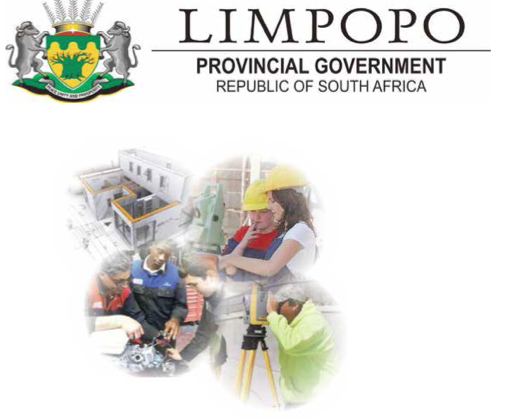 Limpopo Province experiences a shortage of qualified Engineers, Technicians and other needed scarce skills to establish, maintain and manage Government office buildings, efficiently.
Limpopo Province experiences a shortage of qualified Engineers, Technicians and other needed scarce skills to establish, maintain and manage Government office buildings, efficiently.
Purpose
- To address skills shortage in the Department.
- To offer financial assistance to the previously disadvantaged individuals to acquire skills that are needed in the Department and in the construction sector within the province.
- To promote economic growth, employability and social development.
- To create awareness and accessibility to built environment careers.
Eligibility for consideration
Candidates must be:
- South African residing in Limpopo Province, students intending to or already studying towards a degree/diploma at a recognized South African tertiary institute and within the built environment.
- Able to provide proof of academic results for grade 12 or alternatively be in possession of an acceptable alternate qualification.
- Accepted by the university/technikon.
Bursaries available / targeted areas
- Degree in Building Engineering
- Degree in Mechanical Engineering
- Degree in Electrical Engineering
- Degree in Civil Engineering
- Degree in Quantity Surveying
- Degree in Architectural Science
- Degree/N. Diploma in Landscaping
- Degree/N. Diploma in Asset Management
- Degree/N. Diploma in Financial Management
- Degree/N. Diploma in Property and Facility Management
Selection criterion
Preference shall be given to:
- Commendable performance
- Proof of acceptance into chosen tertiary institution
- Previously disadvantaged individuals
- Designated groups
Payment process
Proof of registration with particular tertiary institution should be submitted.
- Payment is made after receiving the statement of account from the institutions.
- Payments are therefore made in respect of the following items: Registration, Tuition, Meals, Accommodation, and books
Bursary obligations
After completion of studies, a student may be expected to serve the department, the number of years equivalent to years of sponsorship.
Refund of bursary payments
Failure to comply with the provisions of the bursary agreement will result in the Bursar having to refund immediately all amounts (plus interest) paid by the Department on their behalf.
Closing date for applications
The closing date for applications is 31st October every year.
For more information contact Department of Public Works on 015 284 7000, 43 Church Street, Polokwane, Limpopo Province. HRD contact details 015 284 7422, 015 284 7107/7156
Postgraduate Maritime Affairs scholars head for Sweden
Postgraduate Maritime Affairs scholars head for Sweden sadminSkills development in the maritime sector gets a huge boost as 30 students jet off to study Maritime Affairs in Sweden.
South Africa needs a new cadre of maritime leaders, and I am proud to be a part of the new academia in maritime.” These are the words of Wieman Biyela, who is in Sweden completing his master’s in Maritime Affairs.
Biyela, who works as a Stores Procurement Manager in Pretoria, is one of 30 lucky students who recently received scholarships from the South African Maritime Safety Authority (Samsa), to complete their master’s or doctoral studies in Maritime Affairs at the prestigious World Maritime University (MWU).
The scholarships costing approximately R14 million were made possible by the Department of Higher Education and Training (DHET) in its effort to develop maritime skills. The initiative is part of Samsa’s goal to cement South Africa as one of the world’s top 35 maritime nations.
Recipients Nomcebo Sibisi, a Maritime Economics teacher at New Forest High School in Durban, and Sherry Vermaak, a maritime attorney from Cape Town, are ecstatic about their scholarships.
“I am looking forward to the opportunity to pursue my post- graduate studies at such a prestigious international institution. We are very fortunate to have been chosen as the representatives for South Africa. A big thank you to Samsa,” says Vermaak.
Currently, South Africa does not have a dedicated institute for maritime studies. Following a meeting between Samsa‘s chief executive officer, Commander Tsietsi Mokhele and the WMU, Samsa agreed to explore avenues to make enrolment accessible to more South Africans. The WMU jumped on board to further high-level human capacity development in South Africa.
"These postgraduate qualifications in maritime affairs can give South African graduates the professional high-level knowledge required for the maritime sector to flourish, making South Africa a leading maritime nation,” says Mokhele.
Before they departed in September Transport Minister Dipuo Peters urged the students to absorb all they could during their course. She told them to be open-minded and open to enhancing their personal growth.
"You will acquire sufficient knowledge of international regulations, norms and standards and be equipped with international approaches to solving problems. You will be working with colleagues from other countries and will learn to look at problems not only from the point of view of South Africa but also from an international perspective. Upon the successful completion of your studies, you will make a very important contribution to the development of the maritime industry,” added Minister Peters. Advocate Gary Beale from the Cape Bar in Cape Town said that receiving the scholarship was an opportunity to advance his career. Beale will be studying towards a master’s degree in Maritime Law and Policy. The 11-month course will include three weeks of field study in London.
Studying at the WMU, says Beale, will be an opportunity to exchange ideas with peers from around the world about the development of maritime law policy. “This will be a great benefit for South Africa, and the chance to study at the World Maritime University in Sweden is for me a wonderful opportunity not only to engage with experts in their respective field but also meet colleagues from all over the world and exchange ideas and draw upon each other’s experience and knowledge to help develop and strengthen South Africa’s maritime economy within a global context,” said Beale.
This is the first batch of students from South Africa to get qualifications in Maritime Studies from the WMU. Samsa is currently in talks to roll out the scholarship programme annually.
For more information on the programme contact Samsa at tel. 012 366 2600
IDC creates 19 000 iobs
IDC creates 19 000 iobs sadminThe Industrial Development Corp-oration (IDC) has created 19 000 and saved 4 000 jobs in the market conditions, the corporation has continued playing a proactive role in the economy by supporting the development of key industries.
Announcing the IDC’s annual results, Minister of Economic Development Ebrahim Patel said the corporation had been successful in seven major areas of its work.
These are industrialisation, infrastructure development, greening the economy, job creation, small business development empowerment, innovations in financing arrangements, and African regional development.
According to the Minister, manufacturing remained critical to industrialisation as it created direct jobs and sustained a large number of indirect jobs. Since 2009, the IDC's total assets rose from R89 billion to R127 billion signalling growth of 43 per cent.
The IDC had also invested R45 billion in projects in the form of equity or loans in the past four years.
Though the corporation has created jobs, there are some problems that need to be addressed. One of them is for the IDC to focus more on youth entrepreneurs.
Minister Patel said R2.7 billion was available for the next five years for special youth funding.
Informal trading puts food on the table
Informal trading puts food on the table sadminThree years ago, Hlengiwe Ngidi of Lamontville in Durban decided that she would not let her lack of formal education keep her poor and unemployed.
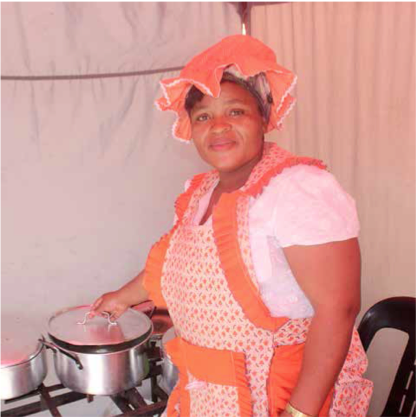 Armed with determination and a little start-up money, she took to the streets of Durban to cook and sell food.
Armed with determination and a little start-up money, she took to the streets of Durban to cook and sell food.
The bubbly Ngidi cooks breakfast and lunch for taxi drivers of Umlazi Township. Her tent in downtown Durban shelters her customized kitchen that has a gas stove and a table and chairs. The delicious smell of beef stew, which she serves with Phuthu, lures customers to her.
“I realised that sitting at home and waiting for a job will not help me. I started with selling chicken feet on the side of the road. This came with challenges because at the time I did not have a street vending permit to sell on the streets.”
Ngidi says she realised that her business was progressing fast and when she saw a gap in the market she took it: no one was cooking breakfast and lunch for taxi drivers using the Umlazi rank in the central business district.
“I decided to take a loan from the local society in my area. I remember I asked for a R3 500 loan to start the business. I then went to the eThekwini Municipality Offices to apply for a street vending permit.
“It took a month for the municipality to get back to me and I was already on my feet selling my meals.”
Ngidi employs two people who help her prepare and deliver meals.
A typical day starts at 7am when she collects her tent and stove from storerooms around the city and ends after lunchtime when all the food has been sold.
“I start by preparing breakfast which includes beef liver, eggs and four slices of bread. For lunch I alternate between beef and chicken stew with rice or Phuthu served with two side salads. Breakfast costs R14, while lunch is R16 for small and R22 for large.
“On a typical day I make about R300 – money that sustains my family of six.
“With this money I have been able to build my mother a house and I also pay school fees for my daughter who is in Grade 10.”
Ngidi says having a street-vending permit makes her life easy because when the Metro Police raid street vendors she does not have to run or hide from them.
She encourages others to follow her example and tap into their talents to make a living.
The eThekwini Municipality says it has over 40 000 street vendors across the municipality and that operating in the city without a permit is illegal.
It costs between R39 and R110 a month for a street-vending permit.
Once all the documents have been submitted, processing the street-trading permit should be finalized within 30 working days.
The site for which you have applied will be inspected to ensure that you comply with all relevant requisites such as road traffic requirements and health regulations.
Delays can sometimes be caused by late responses from some relevant departments that have to comment on the application or your compliance.
To apply for a permit, you must:
- State what type of goods you will sell.
- Indicate what you will use to conduct the business e.g. a cart, tables or marquee.
- Provide your address and telephone number.
- Provide the municipality with a letter from the owner of the building that you wish to trade next to.
- Include a copy of your identity document.
- You must also provide a hand-drawn sketch of the area you are applying for and also a site map. You can obtain a site map from various municipal development and planning offices.
Abused women become confident and skilled workers
Abused women become confident and skilled workers sadminSince 1997, abused women and children have found a refuge at the Creating Effective Families Centre for Battered and Abused Women in Ridgeway, Cape Town. Often, they leave the centre as confident and skilled people, ready to face the world.
When a woman leaves the Creating Effective Families Centre for Battered and Abused Women, she must be strong, confident and be able to stand on her own two feet to support herself and her children."
This is how Karin Gildenhuys, the director of the shelter and a dear friend to the many abused women of Ridgeview and Mossel Bay at large, continues to inspire women around her. “Domestic violence is rampant, threatening the lives of mostly women and children. In most cases we deal with, substance abuse is a major contributing factor.”
According to Gildenhuys, the biggest problem women are confronted with in violent situations is that of having no alternative shelter and therefore no choice but to stay.
Creating Effective Families (CEF) is a home that offers women a new lease on life. Founded in 1986 as a branch of the Family and Marriage Association of South Africa (Famsa), the project joined with the Mossel Bay Alcohol and Drug Centre in June 2000 to become known as Creating Effective Families. It was the first non-governmental organisation in Mossel Bay to deliver a professional, holistic therapeutic service to individuals and families no matter what challenges threatened their existence. The centre also offers legal assistance to women in abusive relationships.
It can accommodate 25 women and children at any one time, including boys up to 12 years old. Gildenhuys says the centre has helped 1 750 women and children since it was established.
Based in Mossel Bay, the home offers safe accommodation while teaching women basic childcare, baking, phone etiquette and sewing skills so they can qualify for the centre's Home Management course.
Through these lessons, women who seek refuge for themselves and their children can develop skills that help them find employment. To help the centre continue providing for the women and expand their services, the Eskom Development Foundation recently renovated the home’s kitchen and donated sewing machines, a washing machine, two computers, couches, beds and chairs.
“Eskom believes in giving back and assisting with community development, particularly to places of safety for women and vulnerable children. It is our duty to provide assistance to impoverished communities and by supporting community self-help projects like this, we can sustainably contribute to addressing issues of domestic violence in South Africa,” says Haylene Liberty, the chief executive officer of the Eskom Development Foundation.
The centre offers technical skills training to unemployed and unskilled people, education and public awareness on gender equality, HIV/AIDS diseases, dealing with and preventing domestic violence and providing shelter for the destitute. The centre recently extended its services to provide counselling for men as well.
One of the successful projects run by the Creating Effective Families umbrella is a crèche. The project helps parents interact with their children and become involved in their schooling through a series of workshops. “Getting parents involved in their child’s schooling not only adds value but stimulates and strengthens the parent-child bond even further,” says school principle Gaynor Domingo.
One such parent, Dorothy Mayila, whose three-year-old daughter Limyoli attends the school, says the workshops have helped her family a lot. “I have learnt how to communicate with my child, and have also learnt the importance of reading to her. I see she is now more disciplined and has a stable routine.”
Through the centre and school workshops, the project is surely Creating Effective Families to uplift the community.
Mantsopa mothers put Ladybrand on a vegetable diet
Mantsopa mothers put Ladybrand on a vegetable diet sadminA group of women from Manyatseng outside Ladybrand have set up a cooperative that produces vegetables using hydroponic farming methods.
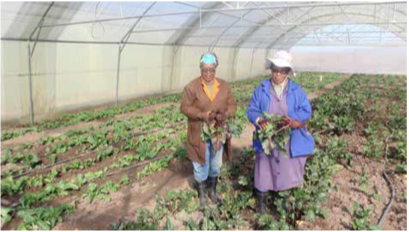 When the late former Premier of the Free State Province Winkie Direko visited the area of Manyatseng in Ladybrand - 137 kilometres from Bloemfontein - to encourage women to get involved in farming, then domestic worker Maria Nkhoke was inspired to start her own farm.
When the late former Premier of the Free State Province Winkie Direko visited the area of Manyatseng in Ladybrand - 137 kilometres from Bloemfontein - to encourage women to get involved in farming, then domestic worker Maria Nkhoke was inspired to start her own farm.
In 2006, she and four other women formed what is now known as the Mantsopa Mother Agriculture Cooperative.
“Once we had registered the business, the real work had to start. We approached the Mantsopa Local Municipality to give us land that we could work from and to educate us on how we could get funding to grow the business. The municipality gave us 60 hectares of land and currently we are only using four hectares,” says Nkhoke, chairperson of the cooperative.
She explains that the cooperative only uses four hectares because the business has not reached its full potential and it is looking at other alternatives to grow the business.
The Mantsopa Mother Agriculture farms vegetables such as spinach, tomatoes, carrots, green peppers, beans and potatoes. They supply to local retailers, including Spar, Cambridge, Fruit and Vegetables - and to the community at large. The municipality gave the cooperative land and advised them to apply to the National
Development Agency (NDA) for funding. “We received funding from the NDA which we used to buy four tunnels for our hydroponic farming method. The provincial department of agriculture also gave us R75 000.”
An advantage of hydroponic farming is that it has more stable and higher yields than the traditional way of farming.
Nkhoke says no soil is needed for hydroponics. Because the water stays in the system and can be reused, there are lower water requirements and pests and diseases are easier to get rid of than in soil because of the container's mobility.
Dr Anthony Bouwer, NDA Free State Provincial Manager, says the NDA started working with the women early on.
“The initial funding from the NDA was R757 900 in 2006 while they still operated from a school, before registering as a cooperative. The NDA requested them to involve younger people for sustainability as well as for additional help. While still operating from the school, they used wheelbarrows to transport their goods.”
Bouwer says that the funding from the NDA was used to buy tunnels, a cool room and to provide capacity-building and stipends for members.
“We decided to fund Mantsopa because of its focus on job creation and food security. I am proud to say that Mantsopa is one of our most successful projects in the province. The commitment shown by the members during our funding period was outstanding. Even now, the mothers are still working hard to better their lives and those of their community.”
Currently, the cooperative employs five permanent and seven casual workers. Agriculture students from Glen Agricultural College in Bloemfontein do their practical training at the farm.
The cooperative also has a mentor who works as a general manager, Thabiso Mahono, who is a registered geologist from the University of Pretoria.
Nkhoke says they work very well with Mahono who has an educational background in farming and running a business.
Everything around the farm is dusty and dry, except for the green crops that peep out of the warm tunnels where they are farmed.
Nkhoke says starting the business was not easy and required patience and passion. The cooperative has big plans for the farm. “We would like to export our products to other countries and be part of the Good Agricultural Practices organisation. We also want to have a nursery to produce our own seeds,” says Mohono.
He says the business is doing very well and expresses confidence that in time, they will be able to use all 60 hectares of the farm.
It’s up to each individual to work hard to earn a living and leave a legacy for the young people, says Nkhoke.
Transnet hub: where the entrepreneur is king
Transnet hub: where the entrepreneur is king sadminAspiring entrepreneurs can register their businesses, apply for tax certificates, get their Black Economic Empowerment (BEE) status verified, get advice or apply for funding at the Transnet Business Development Enterprise Development Hub at the Carlton Centre in Johannesburg.
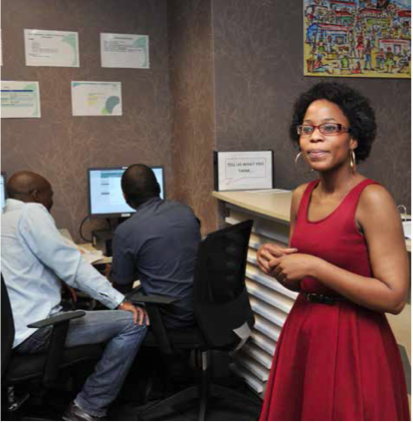 Transnet has invested R60 million in the hub from the R200 million allocated to enterprise development. According to chief supply chain officer for integrated supply chain management Garry Pita, the hub is the first of its kind to offer different services under one roof.
Transnet has invested R60 million in the hub from the R200 million allocated to enterprise development. According to chief supply chain officer for integrated supply chain management Garry Pita, the hub is the first of its kind to offer different services under one roof.
“The problem that small businesses are faced with is that when they go to different hubs or enterprise development centres in the country, they will only be assisted with one or two aspects of their issues.” With the new hub, all services are offered in one place.
He added that the smallest businesses or start-up businesses are faced with multifaceted challenges and the new hub will assist in solving the problems quickly.
“They could have issues with starting their business, they might have tax compliance is- sues, they might not know how to get verified for BEE, they might not have access to funding or even how to administer their business. Now, this hub caters for all of that,” said Pita.
“You don’t have to go anywhere else. We’ve got a verification agency, we've got SEDA, we’ve got Gauteng Enterprise Propeller, we’ve got National Youth Development Agency, we’ve got SARS and we’ve got the Companies and Intellectual Property Commission, and we’ve got Transnet itself that can assist you with issues like how to do business with Transnet."
Pita added that Transnet is planning to implement similar hubs in other provinces.
He said that the hub was opened as part of Transnet’s aggressive drive to expand opportunities for smaller enterprises and to propel new entrants into the market, especially black- owned entities.
“We had done a lot of work in indirect enterprise development through our programmes such as the Competitive Supply Development Programme.
“We then decided to start targeting direct enterprise development for small businesses with specific focus on those that are black-owned, black-women owned, people with disabilities, youth and even military veterans.”
Pule Raikana and Victor Mampuru who experienced the services offered by the hub fi hand had positive things to say about it. The two Riverlea residents say the advice they received from the consultants at the hub is valuable. The two want to open a car wash and chisanyama.
Public Enterprises Minister Malusi Gigaba said small businesses were the lifeblood of the economy. He added that 12 million South Africans relied on small businesses to get by.
“The aim of this intervention is to ensure that we increase the participation of small businesses in the mainstream economy, as they have been identified as critical to unlocking economic growth and to pursue inclusive growth.
“Small businesses in South Africa employ between 60 and 70 per cent of the employable population. I therefore believe that it is our responsibility as government to harness this opportunity,” he said.
Transnet’s other investments
- Transnet has invested R24 million in the Transnet Lending Fund in partnership with the Gauteng Enterprise Propeller
- Transnet has invested R30 million in Shanduka Black Umbrellas Incubation, a non-financial support service aimed at incubating 100% black-owned SMMEs, which meet Transnet’s supply chain needs. The initiative is set to benefit the KwaZulu-Natal, Richards Bay and Eastern Cape (Coega) areas.
Nomzamo branches into Moringa trade
Nomzamo branches into Moringa trade sadminYouth matters
Nomzamo Mthethwa- Khoza has turned her love for indigenous trees into a lucrative business that produces various products and provides employment.
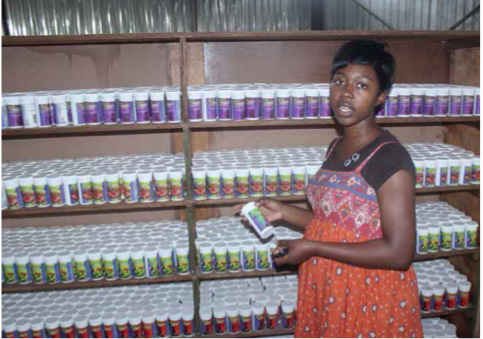 When Nomzamo Mthethwa-Khoza, 26, quit the corporate world in 2010 to follow her love for indigenous trees, she never dreamt that she would one day be crowned the female farmer of the year.
When Nomzamo Mthethwa-Khoza, 26, quit the corporate world in 2010 to follow her love for indigenous trees, she never dreamt that she would one day be crowned the female farmer of the year.
But Khoza came out tops when she won the top female exporter and the overall female farmer of the year award during the 2013 female entrepreneurs' awards. The awards are organised by the national Department of Agriculture, Forestry and Fisheries.
Khoza’s farm and a processing plant are in Mnini near Port Shepstone. Her company is divided into two sections: People’s Bio Oil (PBO) and Morana Fire for Africa.
She makes over 201 products, which include tonics, capsules, hair food, body products, spices and sauces made from the Moringa tree. All her products are natural and have no chemicals. PBO is the manufacturing section of her business while Morana is the brand under which the products are sold.
Her company employs 120 people and has 200 distributors of the Morana products countrywide.
Passion for plants
Khoza hails from eNkanyisweni, a village in Mbumbulu which is 13 kilometres from Dur- ban. She says though she studied accounting at Durban University of Technology she always wanted to do something different.
“I had a love for plants and it interested me that alien invasive plants were affecting our green lands in the country.”
Alien invasive plants are plants that are not from South Africa and that effect plants grown in South Africa negatively.
“Around 2004, through our journey with my husband of wanting to learn more about plants and trees, especially indigenous plants, we found the Moringa plant. We did a lot of research about it and discovered all its benefits.
Years later - in 2011- we started our business, Morana, produced by PBO,” says the soft-spoken Khoza.
The Moringa tree’s leaves are rich in protein, vitamins A, B, C and minerals.
The struggle to get funding
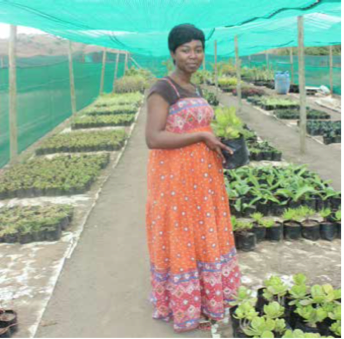 Khoza and her husband Vusi say that starting the company from scratch with no funding and not much business experience was not easy.
Khoza and her husband Vusi say that starting the company from scratch with no funding and not much business experience was not easy.
“The most challenging part of getting the business off the ground was that when we knocked on doors for assistance, nobody understood what we were doing. Farming indigenous trees was something unusual." The couple also made sure that they equipped themselves with knowledge by doing courses in agricultural studies.
They bought land from the local chief and sold all their assets to build capital to start the business because they had a vision.
“We also had a mentor who taught us how to make body lotions from the Moringa tree. Producing tonics was something that is in our families, which we learned from elders.” She says whenever they mix products, they are taken to the laboratory for nutritional value testing and whether they are safe for consumption.
Today the couple also export their products to Mozambique and Argentina. "All I can say is that our business is doing very well.”
Raking in the money
Khoza won R125 000 as the best farmer from KwaZulu-Natal. During the national awards, she won R250 000 for best exporting and received R500 000 for being the overall winner in South Africa.
She says winning all these categories was most unexpected and the money will help grow the business.
“I am a person that loves the environment, I always dreamt of living in a place far away, doing my own thing overlooking the mountains with a river flowing below my home."
A farm with a natural view
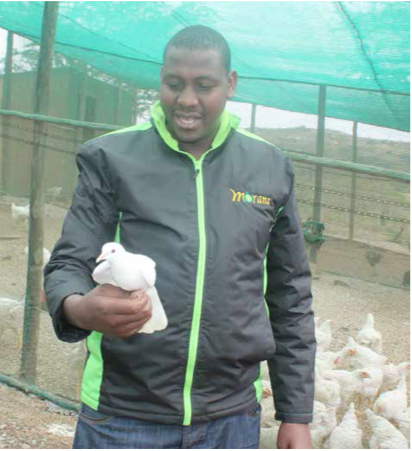 Her dream of living with the environment came true as Khoza’s home is situated on her farm. The air is crisp and the only noise is that of the birds and chickens.
Her dream of living with the environment came true as Khoza’s home is situated on her farm. The air is crisp and the only noise is that of the birds and chickens.
Her thatched roof home is on a mountain top where there is a stunning view of the mountains that surround her, the manufacturing firm and the nurseries that produce the indigenous trees. To complete the look, there is a river that flows close to the distribution firm but when standing or sitting at Khoza’s lounge, one is able to see the river flow from the hill.
“We try by all means to make sure that everything we do is natural and organic.”
Khoza not only produces products from the Moringa tree but also farms indigenous trees, flowers, chickens, birds, oyster mushrooms, herbs and will soon be farming tilapia fish.
The indigenous trees that she plants include Haworthia, which can be used for landscaping, the charm tree plant and the plum bush plant which is rich in vitamin C and helps boost the immune system.
She sells the plants to nurseries and plants shops. Her chicken farm works very closely with the local community as she buys maize from local small-scale farmers to feed her chickens.
“We are also in the process of running a programme to teach the local community how to farm chicken properly.”
Her poultry farming includes cockatiels, quails and lovebirds, which she sells to pet shops.
"Oyster mushrooms are specifically for food security for all employees of the company from the area. We teach them how to farm and pro- vide all the seeds. Whatever they make from the mushroom farming is their own benefit."
To explore opportunities for expanding her business, Khoza is building a laboratory on the farm for testing products.
“We are also in the process of building a pack- aging area so we can plant manufacture and package all our products. We are also extending the factory to make it bigger.”
Khoza says young people should not wait for opportunities to come their way, but should create their own opportunities.
“There is so much that you can do if you have a vision. Get out of your comfort zone. Everything that we do depends on agriculture.”
Constitution: The foundation of our democracy
Constitution: The foundation of our democracy sadminWhat is the Constitution?
 Following many years of the struggle for freedom, South Africa established a democratic government in 1994. A constitution was created and developed as the most important book of rights for South Africans - it is the highest law of the land. The Constitution was drawn up by the Parliament elected in 1994 and was signed into law 15 years ago by former President Nelson Mandela. It outlines the rules, rights and responsibilities of every citizen and defines the structure of the South African government.
Following many years of the struggle for freedom, South Africa established a democratic government in 1994. A constitution was created and developed as the most important book of rights for South Africans - it is the highest law of the land. The Constitution was drawn up by the Parliament elected in 1994 and was signed into law 15 years ago by former President Nelson Mandela. It outlines the rules, rights and responsibilities of every citizen and defines the structure of the South African government.
Why do we need a Constitution?
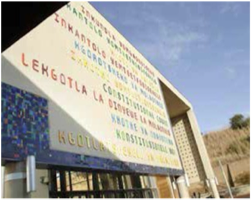 The Constitution promotes a better life for all citizens, and binds the State to respect, protect, promote and fulfil the right of every South African. It is used as a legal guide in court and within our legal system, to ensure that all citizens, regardless of race, culture or gender are treated with equal dignity and respect.
The Constitution promotes a better life for all citizens, and binds the State to respect, protect, promote and fulfil the right of every South African. It is used as a legal guide in court and within our legal system, to ensure that all citizens, regardless of race, culture or gender are treated with equal dignity and respect.
What does the Constitution say?
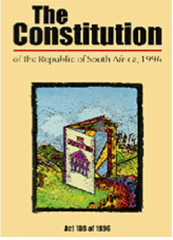 Human rights forms the foundation on which the Constitution was created. It aims to create a society based on democratic values, social justice and fundamental human rights. According to our Constitution, every South African has basic rights, including human dignity, equality, freedom of expression and association, political and property rights, housing, healthcare, education, access to information and access to courts. Another issue given prominence in the Constitution is language. The Constitution states that everyone has the right to use the language and participate in the cultural life of his or her choice. The Constitution recognises all 11 official languages - Afrikaans, English, isiNdebele, isiXhosa, isiZulu, Sepedi, Sesotho, Setswana, siSwati, Tshivenda and Xitsonga. But specific attention is also paid to the Khoi, Nama and San languages and to sign language.
Human rights forms the foundation on which the Constitution was created. It aims to create a society based on democratic values, social justice and fundamental human rights. According to our Constitution, every South African has basic rights, including human dignity, equality, freedom of expression and association, political and property rights, housing, healthcare, education, access to information and access to courts. Another issue given prominence in the Constitution is language. The Constitution states that everyone has the right to use the language and participate in the cultural life of his or her choice. The Constitution recognises all 11 official languages - Afrikaans, English, isiNdebele, isiXhosa, isiZulu, Sepedi, Sesotho, Setswana, siSwati, Tshivenda and Xitsonga. But specific attention is also paid to the Khoi, Nama and San languages and to sign language.
Paving a democratic future
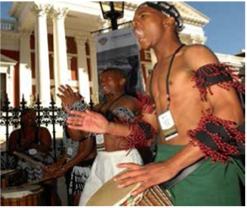 The 1994 democratic election was the first time that citizens who had been marginalised for many decades could vote. The Constitution was adopted to heal divisions of the past and establish an open society based on democratic values, social justice and fundamental human rights where government is based on the will of the people. Today, it is regarded as the most progressive constitution in the world. Since 1994, government has created platforms for citizens to participate in the development of the country at national, provincial and local levels of governance.
The 1994 democratic election was the first time that citizens who had been marginalised for many decades could vote. The Constitution was adopted to heal divisions of the past and establish an open society based on democratic values, social justice and fundamental human rights where government is based on the will of the people. Today, it is regarded as the most progressive constitution in the world. Since 1994, government has created platforms for citizens to participate in the development of the country at national, provincial and local levels of governance.
For instance, today, parents play a vital role in shaping the future of education and learners at schools by actively taking decisions on educational issues and School Governing Bodies (SGBs). The country has also created a platform for learners, through Learner Representative Councils (LRC), to participate in issues affecting the future of their education. Citizens are also more involved in making decisions on Integrated Development Plans (IDPs) at local government level. These developments and other related participatory platforms are a dynamic improvement in ensuring citizen
Bill of Rights - what are the citizen’s responsibilities?
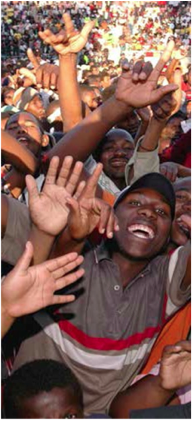 The Bill of Rights ensures the rights of all people in the country and upholds the democratic values of human dignity, equality and freedom. One of the most important elements of democracy is respect for each other’s rights. The ongoing violence against Gays, Lesbians, Bisexuals, Transgender and Intersexed (LGBTI) community, foreigners, women, children, persons with disability and the elderly is a serious violation of their rights to human dignity, equality and freedom. Government has put in place a number of measures to address and end this scourge of violence.
The Bill of Rights ensures the rights of all people in the country and upholds the democratic values of human dignity, equality and freedom. One of the most important elements of democracy is respect for each other’s rights. The ongoing violence against Gays, Lesbians, Bisexuals, Transgender and Intersexed (LGBTI) community, foreigners, women, children, persons with disability and the elderly is a serious violation of their rights to human dignity, equality and freedom. Government has put in place a number of measures to address and end this scourge of violence.
These actions go against the intent of the Constitution, which requires citizens to build a human rights culture and to respect the rights and freedoms of others.
The role of state institutions
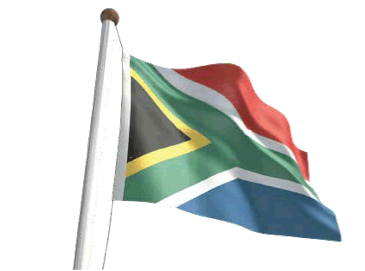 Chapter 9 of the Constitution gives birth to a number of institutions which are tasked with strengthening constitutional democracy. These institutions include the Public Protector, commissions addressing human rights, gender equality and elections, the Auditor-General, the Commission for the Pro- motion and Protection of the Rights of Cultural, Religious and Linguistic Communities and the Independent Electoral Commission. No person or organ of state may interfere with the functioning of these institutions. The main purpose and function of these institutions is to protect human rights for all, investigate human rights abuses and come up with helpful actions. They may also serve as mediators between victims whose rights have been infringed and the actual perpetrators. They are able to help citizens claim their rights, and provide access to justice for all.
Chapter 9 of the Constitution gives birth to a number of institutions which are tasked with strengthening constitutional democracy. These institutions include the Public Protector, commissions addressing human rights, gender equality and elections, the Auditor-General, the Commission for the Pro- motion and Protection of the Rights of Cultural, Religious and Linguistic Communities and the Independent Electoral Commission. No person or organ of state may interfere with the functioning of these institutions. The main purpose and function of these institutions is to protect human rights for all, investigate human rights abuses and come up with helpful actions. They may also serve as mediators between victims whose rights have been infringed and the actual perpetrators. They are able to help citizens claim their rights, and provide access to justice for all.
The Constitution goes a long way in protecting and promoting the rights of all people in South Africa. All institutions and the general public are expected to fulfil and uphold its values and principles.
For more information on the Constitution contact the Department of Justice and Constitutional Development at tel. 012 315 1111.
New Batho Pele call centre gives residents stronger voice
New Batho Pele call centre gives residents stronger voice sadminHotline
The Department of Public Service and Administration (DPSA) has re-launched government’s Batho Pele call centre to get public feedback on the implementation of the new Public Service Charter.
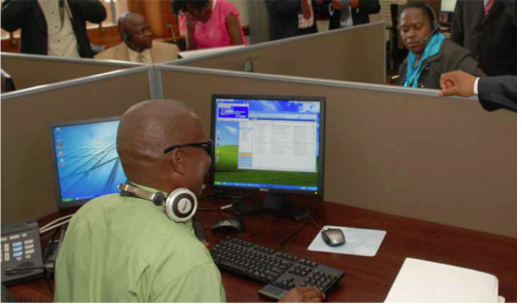 Launched by DPSA Minister Lindiwe Sisulu recently, the charter aims to empower South Africans, helping them to know their rights and report bad service. To ensure the charter’s vision becomes a reality, a portfolio committee on public service and administration has been established. Acting committee chairperson Eric Nyekembe says government knows what lies ahead. "We are all aware of the challenges facing our people and we hope this charter will introduce a chapter where government and labour will work together to improve service delivery. This charter must empower our people to report and complain when they are faced with bad service."
Launched by DPSA Minister Lindiwe Sisulu recently, the charter aims to empower South Africans, helping them to know their rights and report bad service. To ensure the charter’s vision becomes a reality, a portfolio committee on public service and administration has been established. Acting committee chairperson Eric Nyekembe says government knows what lies ahead. "We are all aware of the challenges facing our people and we hope this charter will introduce a chapter where government and labour will work together to improve service delivery. This charter must empower our people to report and complain when they are faced with bad service."
To ensure citizens have an effective, efficient and responsive public service the new charter wants public servants to commit to:
- Serve the public in an unbiased, impartial manner
- Provide timely services
- Respect and protect each person's dignity and rights as contained in the Constitution that conflicts with or infringes on the execution of their duties
- Act against fraud, corruption, nepotism and maladministration
- Demonstrate professionalism, competency and transparency in the performance of their duties.
During the drafting of the charter, the public was asked to comment and give suggestions on how government can improve service delivery. Public feedback included public servants being on time and working daily to resolve their problems.
“That's all our people are asking for - a public service that meets their expectations," said Minister Sisulu.
The new Batho Pele call centre number is 0860 428 392. South Africans are urged to contact the call centre to report lack of service delivery or to highlight issues in their area.
The new call centre number is 0860 428 392.
Govt recovers R330m via anti-corruption hotline
Govt recovers R330m via anti-corruption hotline sadminHotline
Government has recovered R330 million after investigations into allegations of corruption received by the National Anti-Corruption Hotline, which the Public Service Commission operates.
A total of 17 110 cases of alleged corruption were generated be- tween September 2004 and 31 August 2013, and 2 638 officials found guilty of misconduct related to corrupt activities in the same period.
President Jacob Zuma revealed this while addressing editors, bureau chiefs and political editors in Pretoria recently. At provincial level, 1 728 officials were found guilty of misconduct related to corrupt activities, whilst 910 officials were found guilty of misconduct related to corrupt activities at national departments.
President Zuma said 491 officials were suspended and 1 600 were dismissed from the Public Service.
A further 256 officials were fined three months' salary, 31 officials were demoted, 541 officials were given final written warnings and 210 officials were prosecuted.
The hotline, which the Public Service Commission runs, has been in operation since September 2004 and allows people to report allegations of corrupt activities by public officials.
You can report corruption by calling the Anti-Corruption Hotline at 0800 701 701.
SAnews.gov.za
Electric vehicles plug into South African market
Electric vehicles plug into South African market sadminHotline
Showrooms across the country are preparing to sell the first electric-powered vehicles.
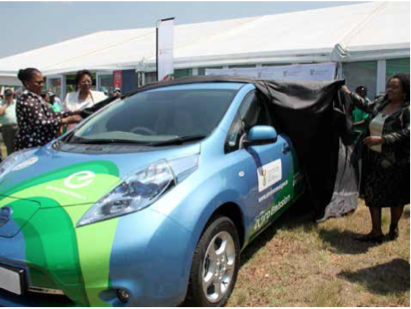 Nissan will be the first company to introduce electric vehicles, which promise to reduce carbon emissions.
Nissan will be the first company to introduce electric vehicles, which promise to reduce carbon emissions.
According to Veralda Schmidt, media relations manager of Nissan South Africa, “around mid-October the Nissan Electric Car will be on the market”. Nissan will announce at the Johannesburg Motor Show how much the car will cost. “The vehicle will be available at our dealerships in Gauteng and later rolled out to other provinces.”
The vehicle, which only needs electricity to function, was launched in February by Minister of Environmental Affairs Edna Molewa in conjunction with Nissan South Africa.
“The fundamental motivation for being part of the project was the need for South Africa to turn into a job creating, sustainable, low carbon and green economy as clearly outlined in South Africa’s National Development Plan,” said the Minister at the time.Minister Molewa said the automotive sector was one of the major sources of greenhouse gas emissions which resulted primarily from the burning of fossil fuels, including petrol and diesel. “The transportation sector accounts for 30 per cent of carbon emissions in industrialised economies and about 20 per cent worldwide. Globally, the sector is the third largest contributor to air pollution.”
What makes the electric car so environmentally friendly is that it is powered by lithiumion batteries, not an engine.
“Electric cars do not have a fuel tank either as they do not require fuel. The lithium-ion batteries are charged using a dedicated wall box charger at home or at a Public Charger available at Nissan dealers,” said Letlhogonolo Matlou, acting product manager at Nissan South Africa. Schmidt confirmed this, saying that “charging stations will be placed at all Nissan dealerships and consumers could also request a home charger”. He added that after being charged, the vehicle can travel for around 195 km, which is sufficient for most daily trips.
The car does not have an exhaust system, which means it produces no carbon emissions, said Matlou.
Four Nissan LEAF test cars were placed at the disposal of the Department of Environmental Affairs for use and testing in the initial phase of the project.
The electrical car is fully operational in 23 countries, with South Africa now on the list. The shift to electric vehicles will help South Africa to reduce its carbon emissions, said Minister Molewa. “The green transition in the automotive sector presents an enormous opportunity because, currently, South Africa is the 18th largest manufacturer of vehicles in the world and represents 80 per cent of Africa's vehicle output, but only 0,6 per cent of the world market. Its significance to the domestic economy is shown by the contribution in 2010 of 6,2 per cent to the Gross Domestic Product and it employs more than 230 000 people in manufacturing, distribution as well as the retail industry.”
President Zuma demands democracv in global system
President Zuma demands democracv in global system sadminInternational relations
President Jacob Zuma challenged world leaders in New York recently, saying that global development and security were "two sides of the same coin" as he called for action to reform the United Nations Security Council.
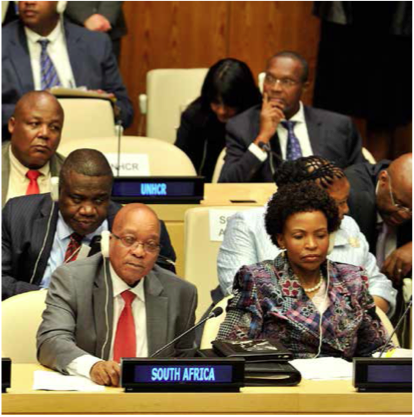 President Jacob Zuma has accused the United Nations Security Council (UNSC) of being undemocratic, unrepresentative and unfair towards developing nations and small states.
President Jacob Zuma has accused the United Nations Security Council (UNSC) of being undemocratic, unrepresentative and unfair towards developing nations and small states.
Addressing the 68th session of the United Nations General Assembly held recently under the theme ”Setting the stage for the post-2015 agenda”, President Zuma urged role players to level the playing field for Africa to set a new global development agenda for the years following the end of the current cycle in 2015. There had been too much talk about reforming the council - a key UN organ charged with the maintenance of international peace and security - with no action, President Zuma said. Africa, along with the rest of the developing world, could not "remain beholden indefinitely to the will of an unrepresentative minority on most important issues of international peace and security.
"We would like to challenge the Assembly today: let us set ourselves the target to celebrate the 70th anniversary of the United Nations in 2015 with a reformed, more inclusive, democratic and representative UN Security Council." At the same time, Zuma criticised developed countries for their tendency, following the global economic meltdown prompted by the financial crisis of 2008 and 2009, to "renegotiate the rules of the game".
The President warned that new international demands were impeding Africa’s development. “New issues are being introduced as pre- requisites for development and partnerships, which in fact become huge non-tariff barriers.
These include the green economy and clean technology.”
While these issues were important for Africa and developing countries and needed to be attended to, the President said the manner in which they were crafted restrained economic development.
With the 2015 deadline for the Millennium Development Goals looming, President Zuma said the full implementation of the goals - which look at poverty alleviation, education, gender equality, child and maternal health, environmental stability and HIV/Aids reduction, among others - remained critical.
For Africa, in particular, the future development agenda should address poverty eradication, income inequality and job creation, Zuma told the national assembly.
He added that the new development agenda would only be effective if it focused on all three dimensions of sustainable development, which are the eradication of poverty through economic development, social development and environmental sustainability.
While recognising the fiscal challenges facing developed nations, President Zuma also urged richer countries not to lose sight of the ripple effects that cut development aid to poorer nations.
“The tendency to attempt to delegate some of these historical responsibilities to new emerging economies in the South is unacceptable and unworkable, as such emerging nations have their own historical challenges and backlogs to deal with. Furthermore, any commitment we make to the future beyond 2015 must build on existing agreements.”
Call for Security Council reform
As President Zuma and many other leaders of developing countries have done in the past, the President used his address to call for the reform of the Security Council by 2015, so that the 15-member body can democratically represent the world’s nations at large.
He also reiterated South Africa’s position regarding Syria, saying the political transition in that country must come about as a result of the will of the Syrian people, and not as a result of a force of arms.
President Zuma also touched on the struggles of the people of Palestine and Western Sahara as well as the Cuban people.
SA-UK agree on business and science collaboration
SA-UK agree on business and science collaboration sadminInternational relations
South Africa and the United Kingdom look set to strengthen ties in business, science and tourism following the 10th South Africa-UK Bilateral Forum in Cape Town recently.
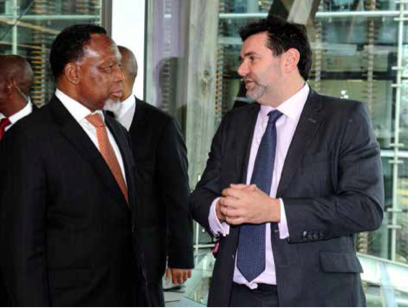 South Africa and the United Kingdom (UK) have launched a business council to promote trade and investment between the two countries.
South Africa and the United Kingdom (UK) have launched a business council to promote trade and investment between the two countries.
This announcement was made following the 10th South Africa-UK Bilateral Forum in Cape Town recently. International Relations and Cooperation Minister Maite Nkoana-Mashabane said the two countries had made considerable progress in strengthening their economic ties.
"The UK is South Africa's largest source of foreign direct investment and our seventh largest export market." Between 2003 and 2012 British companies invested close to R90 billion in South Africa creating 30 000 jobs.
The UK Foreign Secretary William Hague was accompanied by a high-level delegation including the British ministers for Africa, for universities and science, and for energy and climate change.
Minister Nkoana-Mashabane said the forum had discussed the two countries' development cooperation programme. There are approximately 600 British companies operating in South Africa, including Barclays, British Airways and Vodafone. South Africa has over 180 companies operating in the UK.
Minister of Science and Technology, Derek Hanekom, and British Science and Universities Minister, David Willetts, also signed an agreement to promote greater collaboration between scientists from the two countries. Under the agreement, each country will contribute R1.5 million for seminars and conferences that bring together groups of scientists from South Africa and the UK. The scheme will run from October 2013 to March 2015 and be administered by the National Research Foundation and Britain's Royal Society.
South Africa used the occasion to push Britain to lift visa requirements on South Africans visiting the UK. Since 2009, the UK has required people from South Africa, Swaziland and Lesotho to apply for visas, saying it was easy for foreigners to fraudulently acquire passports from these countries.
However, the UK seems to be taking note of the progress South Africa has made in improving its passport security features and clamping down on corrupt officials in the Department of Home Affairs.
"We have noted the increasing flows and movement of people between our countries as a significant trend in our relations," Minister Nkoana-Mashabane said. "The UK is South Africa's number one source of long-haul tourism in the world. In 2012, more than 440 000 tourists from the UK visited South Africa, representing a 9.9 per cent growth compared to the previous year.
"I have informed Foreign Secretary Hague that many more South Africans would like to visit the UK. There is therefore an urgent need to address the challenge posed by the current visa regime."
Sithole powers his way to tennis stardom
Sithole powers his way to tennis stardom sadminSport, arts and culture
SA tennis star Lucas Sithole defies his disability to become US Open champion.
 Sithole, South Africa's top quadriplegic wheelchair tennis player, made history after becoming the fi man from Africa to win a singles match at the 2013 US Open Wheelchair Tennis Competition held in New York, recently.
Sithole, South Africa's top quadriplegic wheelchair tennis player, made history after becoming the fi man from Africa to win a singles match at the 2013 US Open Wheelchair Tennis Competition held in New York, recently.
The 26-year-old defeated America's David Wagner 3-6, 6-4, 6-4 in the final and is now ranked second in the world. Sithole has been on a winning streak since 2007 when he won the Melbourne Open in Australia.
He has never let his disability get the better of him. Just 12 years old, Sithole fell under a train, breaking his legs and right arm. It changed his world forever. With courage and support from his family, he overcame his tragedy to become a world champion.
Today he is a quadriplegic wheelchair tennis champion who enjoys writing music and singing, while studying for a diploma in sports management at the University of Johannesburg.
His dream is to open his own sports centre for people with disabilities. “I don't want anyone to feel sorry for me,” he says. “I’m living my life to the fullest.” President Jacob Zuma also congratulated the star. “We congratulate Lucas Sithole for this important achievement. It was no small feat. He has made both the government and the people of South Africa immensely proud.”
Transnet helps unearth new talent
Transnet helps unearth new talent sadminSport, arts and culture
There was song, dance and ululating at the Boksburg Stadium when learners from seven provinces gathered recently to display their talent in football, netball, chess and athletics.
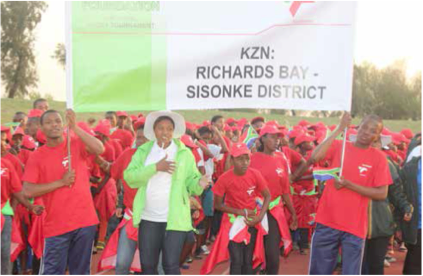 They came from dusty rural and farm schools to participate in the annual Transnet Foundation Rural and Farm Schools Sport Programme. For some it was their first ever trip to the big city to take part in the finals of the Rural and Farm Schools Sport Programme.
They came from dusty rural and farm schools to participate in the annual Transnet Foundation Rural and Farm Schools Sport Programme. For some it was their first ever trip to the big city to take part in the finals of the Rural and Farm Schools Sport Programme.
The tournament attracted 1 638 young learners from North West, Limpopo, Mpumalanga, KwaZulu-Natal, Eastern Cape, Free State and the Northern Cape.
Preliminary rounds for the tournament took place months ago when 22 000 learners from 75 schools participated in an inter-house competition. Five thousand learners were selected to go through to the four regional tournaments where the final number of contestants was narrowed down to 1 638 people.
The Transnet Foundation gives opportunities to learners who do not have access to sport facilities, especially those from far-flung rural and farm schools. According to Rural and Farm Schools Sport Programme Manager Michael Moloto, the foundation saw a need to invest in rural talent. Transnet hosts the programme jointly with the Department of Basic Education.
Transnet spends between R140 million and R160 million a year through the foundation and R20 million through other divisions.
Representing Dihlabakela High School from Greater Sekhukhune Region in Limpopo was Mphogo Keletso, a 17-year-old who has participated in the programme since 2010. She says the programme gave her a chance to interact with other learners and learn from them.
“It has been a good experience and I have learned from the other players. The game has also taught me that in sports, team work is the best way to accomplish your goals.”
Maefa Pabalelo, Keletso’s counterpart from Tlou-Nare High School, says he hopes, through the programme, to tap into his football talent and pursue a football career in the near future. He has participated in the tournament since 2009.
Transnet Foundation Rural and Farm Schools Sport Programme
The tournament started in 2002.
22 000 learners from 75 schools participate in the inter-house competitions.
5 000 learners participate in the four regional tournaments.
1 000 learners participate in the national tournament.
80 Local Organising Committee members have been trained in event management.
80 team managers have been trained in team management activities.
The tournament received national recognition in the form of the Mail & Guardian Investing in the Future award in 2008.
Transnet Foundation Rural and Farm Schools Sport Programme achievements 2003
2003: One of the programme coaches is appointed coach of the national volleyball team travelling to Europe.
2004: A learner from the Eastern Cape is selected for the SuperSport PSL soccer team.
2007 – 2008: Five girls from different regions who play netball through the programme are offered bursaries to study at Rosina Sedibane High School.
2008: A netball player from QwaQwa in the Free State receives a netball scholarship from Tshwane University of Technology.
2010: Three learners from Richards Bay in KwaZulu-Natal are selected for the Orlando Pirates Development Programme and about 90 learners participate in the South African Local Government Association (SALGA) games.
dti brings Mandela movie to a cinema near you
dti brings Mandela movie to a cinema near you sadminSport, arts and culture
Long Walk to Freedom, one of the many films financed by the film incentive scheme of the Department of Trade and Industry (dti), will hit the big screen in November.
 It received rave reviews and standing ovations at the Toronto International Film Festival. Finally Long Walk to Freedom, the film about the life of former President, Nelson Mandela will open in South Africa.
It received rave reviews and standing ovations at the Toronto International Film Festival. Finally Long Walk to Freedom, the film about the life of former President, Nelson Mandela will open in South Africa.
Long Walk to Freedom was made possible by the dti film incentive and directed by renowned South African filmmaker Anant Singh. It features British actor Idris Elba as Mandela and Naomi Harris as Winnie Madikizela-Mandela. Terry Pheto co-stars in the film.Singh says the movie will be unique because it was approved by Mandela himself and the Nelson Mandela Foundation.
The movie is based on Mandela’s autobiography and traces his life journey from his childhood in a rural village in the Eastern Cape through to his inauguration as the first democratically elected president of the country. It is one of the many films funded through the dti film incentive which was established by the department to support the local film industry and contribute towards job creation.
The scheme also offers foreign film television production an incentive which is aimed at attracting large budget film and television productions that will contribute towards South Africa’s economic development and international profile and increase foreign direct investment
Between February 2008 and July 2013, the incentive approved funding for 331 productions to the tune of R9.1 million. Of the 331 productions, 203 were South African, 71 were co- productions and 56 were foreign productions. Between 2004 and 2008, the film programme funded 49 productions, including 16 produced by South Africans, seven co-productions and 26 foreign productions.
Long Walk to Freedom will be released in South Africa on November 28. Producer Anant Singh said he was happy that he was hand-picked by Mandela himself to direct and produce the movie.
“I am delighted to be chosen by Mr Mandela to be the custodian of the film rights of his autobiography which I acquired over 16 years ago. It has been a long journey getting the film made and it has been very fulfilling for me.
“I have always been passionate about Mr Mandela’s life story and I am delighted to have completed the film. We now look forward to presenting the fi to audiences around the world.”